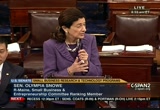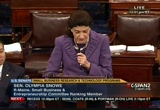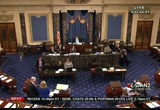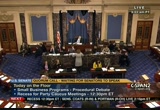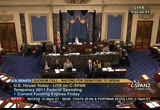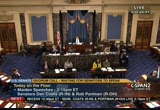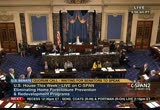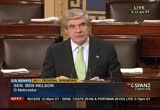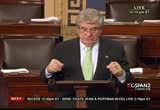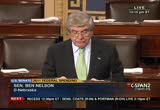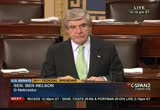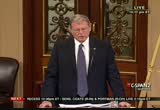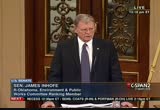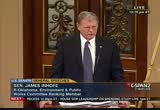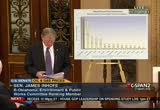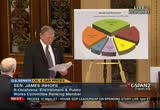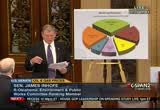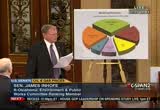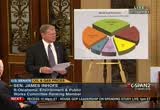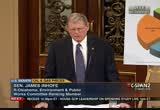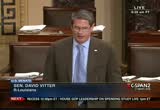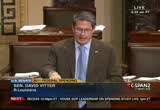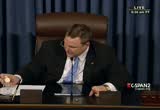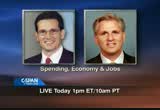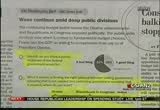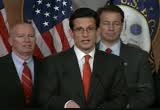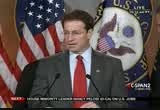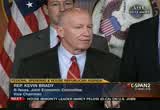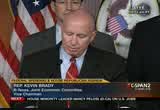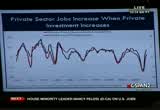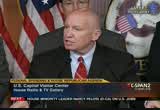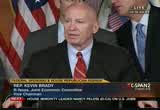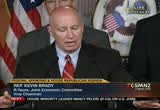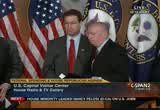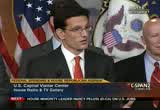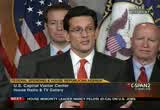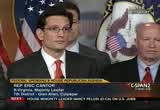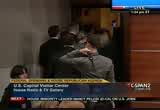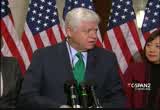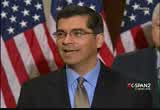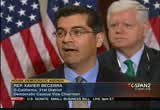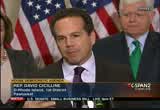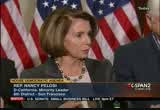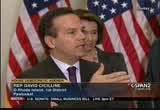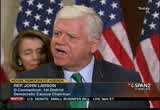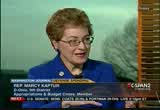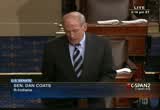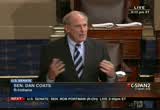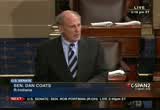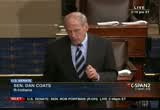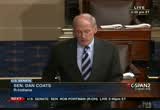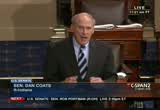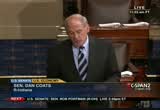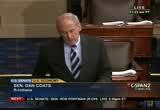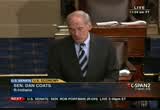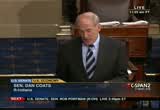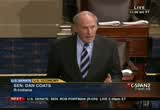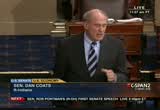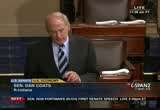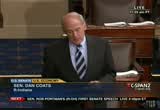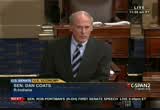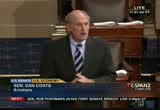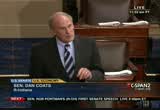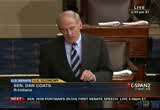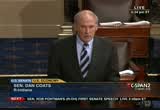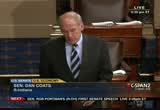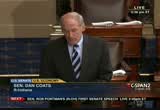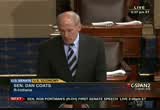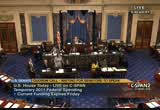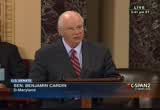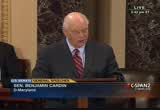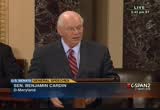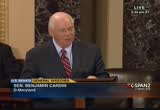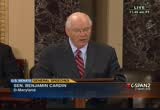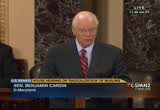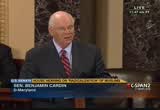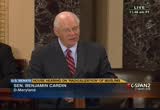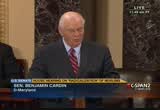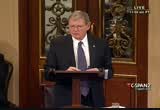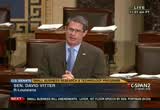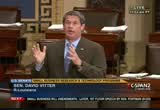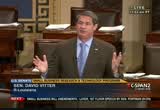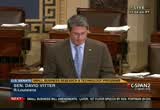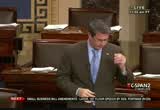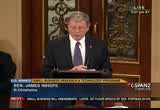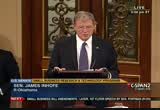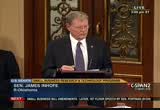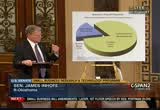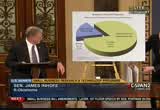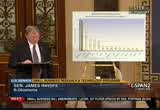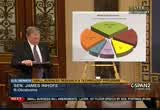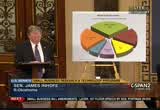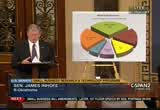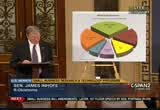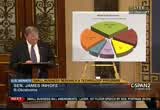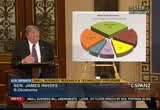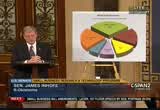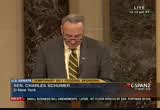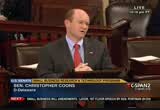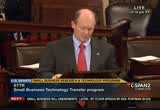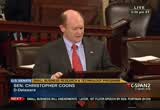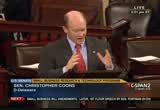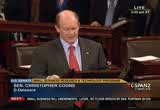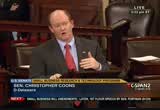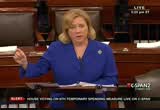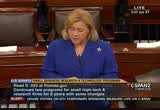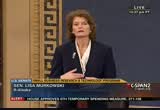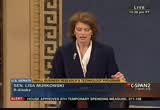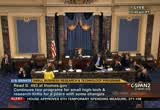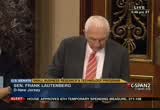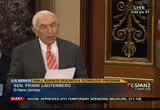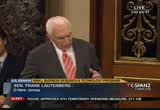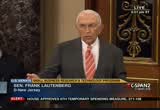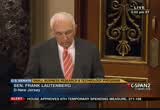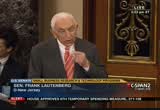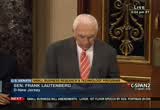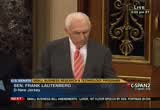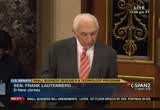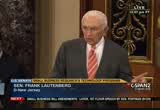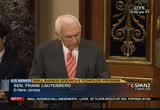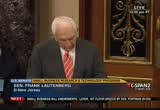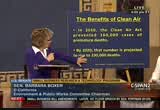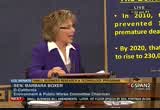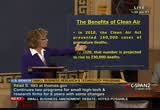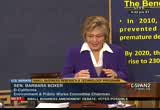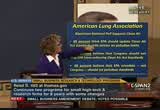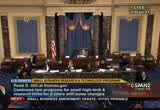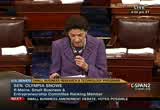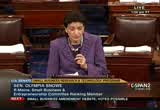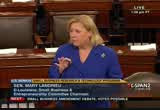tv U.S. Senate CSPAN March 15, 2011 12:00pm-5:00pm EDT
12:00 pm
certainly have been the indication of the many results that we have achieved due to these programs, and that's what makes them, i think, outstanding in that regard because you can draw a cause and effect. and certainly there is a correlation between the effectiveness of these programs among the agencies that award them to small businesses, and they have become the true laboratories for the innovation. understand that transformation, as this report indicated, has been, i think, central to the types of technologies that have emerged over the last three decades. and we want to continue to advance these programs because they are undeniably beneficial and well-worth the investments that are made by these agencies because of their -- you know,
12:01 pm
their ride set-asides for these programs and to ensure that small businesses are part, you know, of the research and development funding that is in the billions of dollars at the federal level if you look at the collective budgets of just these 11 agencies. we want to make sure that small businesses are key to our growth, our technological growth, and, therefore, having these types of programs, i think, can become a major force in developing our innovative economy, as this report indicated recently. so, again, i want to thank the chair for her efforts in that regard. ms. landrieu: thank you, ranking member snowe. and, mr. president, according to the previous agreement, i think we're going to move to a quorum call at this point and then within a short period of time i think the leadership is going to offer two amendments -- lay down
12:02 pm
12:06 pm
mr. reid: mr. president, i ask unanimous consent that the call of the quorum be terminated. the presiding officer: without objection. mr. reid: i ask unanimous consent that the committee-reported amendments be agreed to en bloc, the motion to reconsider be laid on the table en bloc. the presiding officer: without objection. mr. reid: the amended version of $1 493 be considered original text for the purpose of amendment. senator nelson of nebraska be recognized to offer an amendment to s. 493, following the reporting of the nelson amendment, the amendment be set aside and the republican leader be recognized to offer a first-degree amendment to the bill. following the reporting of the
12:07 pm
mcconnell amendment, the republican leader be recognized up to five minutes for debate only. following the republican leader's remarks, the senate resume consideration of the nelson from nebraska amendment. senator nelson be recognized up to ten minutes for debate only relative to his amendment. i would ask that this be modified to allow the republican leader to speak for whatever time he needs for this amendment. the presiding officer: without objection. the republican leader. mr. mcconnell: would -- mr. nelson: mr. president? the presiding officer: the senator from nebraska. mr. nelson: i ask unanimous consent to call up the amendment i just offered to the -- the presiding officer: the clerk will report. the clerk: the senator from nebraska, mr. nelson, proposes an amendment numbered 182. it is the sense -- mr. nelson: i ask to dispense with further reading of the bill. the presiding officer: without objection. the republican leader. mr. mcconnell: mr. president, with gas prices on the rise, americans want to know what
12:08 pm
washington is going to do about it. so let me provide a little update. the white house has responded by locking up the domestic energy supplies and pushing an energy tax that will drive gas prices up even higher. and democrats in congress aren't doing anything at all. so we've got a total disconnect right now between democrats in washington when it comes to gas prices. both the white house and democrats in congress are acting like they haven't seen a nightly newscast or driven by a gas station in weefntle senator inhofe, senator murkowski and senator barrasso has v. done a terrific job of raising the alarm on the administration's efforts to lock up domestic energy even as it continues to push costly new regulations at the environmental protection agency. i want to commend them for their efforts on this most important and timely issue. they've shown how american families are getting a double whammy right now. refiners would pass the costs
12:09 pm
regulated to these regulations on to consumers and the white house efforts to lock up domestic energy production puts even more pressure on gas prices. if you're just tuning in, let's review what the white house has been up to on that front. they've resisted our push for american production offshore, onshore, on the one hand in alaska. and the jobs that go along with it. they've canceled existing drilling permits and the jobs that come with them. they've needlessly delayed offshore leases, which even former president clinton has referred to as "ridiculous." they've imposed a moratorium on oil and gas drilling which amounts to a moratorium on domestic energy-related jobs. they've proposed a tax on domestic energy production. it might be called a minivan tax. and now they're trying to impose a backdoor national energy tax through the e.p.a. it is a strange way to respond to rising gas prices. but it's perfectly consistent with the current energy secretary's previously stated
12:10 pm
desire to get gas prices here in the u.s. up to where they are in europe. these new regulations would destroy jobs at a time when americans need them the most. and they'd be especially devastatdevastating to states ln candidate other coal states. it would jeopardize the livelihoods of the 18,000 minors in kentucky and the additional 200,000 jobs that depend on coal production and the low cost of electricity that kentuckians enjoy. they'd raise the price of everything from electricity, gasoline, fertilizer to the food we eat. and that's why farmers, builders, manufacturers, small businesses, and the u.s. chamber of commerce oppose them and support an effort to stop them. but the white house is determined to get its way, and that's why they're attempting to do through regulation what they couldn't do through legislation, regardless of whether the american people want it or not.
12:11 pm
in my view, it's an insult to the millions of americans who are already struggling to make ends meet to find job. 14 million americans are looking for work. gas prices are approaching $4 a gallon. and the obama administration wants unelected and unaccountable bureaucrats to impose new regulations that will destroy even more jobs and drive gas prices even higher. if you want proof that commons common sense is taking a back side to ideology in the white house, look no further. this plan is bad for jobs and bad for the economy. and it must be stopped. and that's why at the end of my remarks, i'll be introducing an amendment to block it. in an effort to prevent the administration from adding yet another burdensome job-destroying regulation through the back door, we'll have a vote on whether at a time of rising gas prices and growing concern about the scope of government we should allow the white house to impose new energy regulations through the e.p.a.
12:12 pm
this vote is needed because the white house appears ready to advance its goal by any means possible, regardless of our economy or the will of the people, and that it's my hope that we'll vote to stop this power grab in its tracks. now, mr. president, i want to in particular give credit to senator inhofe. this is legislation that he has introduced and has been promoting. it is exactly the same legislation that's moving over in the house of representatives. it's time the senate took a stand on this measure as wevment i believe there is an amendment pending. the presiding officer: there is. mr. mcconnell: yes, i ask unanimous consent that that amendment be temporarily laid aside and i send an amendment to the desk. the presiding officer: the clerk will report. the clerk: the senator from kentucky, mr. mcconnell, proposes amendment numbered 183. at the end -- mr. mcconnell: i ask that the reading of the amendment be dispensed with. the presiding officer: without objection. mr. nelson: mr. president? the presiding officer: the senator nebraska. mr. nelson: mr. president, i
12:13 pm
rise today to speak on the amendment that i've just submitted to the desk dealing with cutting the senate budget by at least 5%. you know, mr. president, when i go home every weekend and i'm at the grocery store or i'mality a hardware -- or i'm at a hardware store, i have people coming to me saying they're concerned about the growing deficit, the increasing debt. and they're asking what can congress do, what can the senate do specifically to avoid having this unsustainable growth and debt and deficit. they're concerned. in many respects, the growth of that debt is the most threatening thing to the national security of this country. mr. inhofe: would the senator from nebraska yield? for a question. i ask the senator from nebraska, the minority leader has just introduced an amendment that is
12:14 pm
pending right now. and i was going to speak on that amendment rather than go to another one. would you yield for just about -- oh, three or four minutes so i could at least weigh in on this amendment? mr. nelson: we will, ordinarily i would grant that request. i have a speech at another location that should be starting about right now. so i will be very brief. mr. inhofe: i ask unanimous consent that at the conclusion of his remarks, i be considered. the presiding officer: without objection. mr. nelson: thank you. admiral mullen noted that the most significant threat to our national security is in fact the national debt. the nation is in a fragile state of recovery, one that we hope will improve the unemployment situation in our country and that will improve the overall economy. but as we look at dealing with the deficit and deficit reduction, we must in fact pursue a very -- a very
12:15 pm
important part of that reduction ourselves here within the confines of the senate. the offices and agencies that serve the members of congress have to be reduced along with the rest of the budget. so in order to address the nation's fiscal crisis, i think the senate must lead by example and reduce our own legislative budget, so it is in that context that i've introduced this resolution of the senate today, a sense of the senate that it should leadly example and reduce the budget of the senate by at least 5%. this is not something new to me. two years ago we held a line on the growth of the senate budget. a year ago we cut the legislative branch budget. we're looking forward beyond this current budget, this continuing resolution, and
12:16 pm
looking at 2012. i would hope that the legislative branch, on a bipartisan basis as in the past with senator murkowski, now with senator hoeven, that we would be able to further reduce the legislative branch budget as we go forward on the 2012 budget that would take effect on october 1 of this year. so, mr. president, this is designed for us to set an example by cutting our own budgets, not just asking other people to tighten their belts, and go through the process of deficit reduction through cuts, but to lead by example and do it ourselves. obviously there will be an opportunity to speak more on this in, at a later time. and i hope that that will generate some more discussion on the floor of the senate. with that, mr. president, i yield the floor.
12:17 pm
the presiding officer: the senator from oklahoma. mr. inhofe: mr. president, first of all, let me thank the senator from nebraska for allowing me to come in immediately following his remarks. mr. president, an amendment was just offered by the majority leader -- minority leader. let me explain what this is. as the former chairman of the environment and public works committee and then now the ranking member, we have been very much concerned for a long period of time over what they're trying to do with cap-and-trade. all the way back to the kyoto treaty, we recognized and then all the way through about five different bills debated on the senate floor, we recognized the cost, incredible cost of what it would be to the american people if we were to pass cap-and-trade legislation. the interesting thing about this is the most votes that were in the united states senate at any one time in order to pass
12:18 pm
cap-and-trade were about 30 votes. obviously it takes a lot more than that. and so what this administration did was say all right, if you're not going to pass cap-and-trade regulation, keep in mind what that is, that would end up being the largest tax increase in the mystery of america on the american people -- if you're not going to do it through legislation, we'll do it through our regulations through the environmental protection agency. and so there was an endangerment finding. the administrator of the e.p.a. had the endangerment finding, and it was based on the ipcc flawed science. nonetheless, it was there. and so they started on a route to regulate co2 through regulations. let's stop and think about what that would be. the cost that we have determined over a period of ten years now to take over the regulation and
12:19 pm
have -- tph-fbgs a type of cap-and-trade -- in fact a type of cap-and-trade through regulation would be about $300 billion to $400 billion a year. i estimated what that would cost an average family in oklahoma. it was about $3,000 for each family that pays, that actually files a tax return. you have to ask the question: what you get if you pass this. first of all, i think most of the people right now are concerned with the price of gasoline at the pump. it's going up again. and i would suggest to you that it's not market forces that are forcing the price up. it is nothing less than just the regulation. we have an administration, mr. president, who is doing all they can to kill fossil fuels in america. right now the most recent -- let's put the chart up there showing that we have in the united states -- and this has
12:20 pm
all happened within the last year. we have the largest recoverable reserves in oil, coal, and gas of any other country in america. in fact, our reserves right there, you can see recoverable reserves, are astronomical compared to china, iran, canada and some of the other countries. now the problem we have is a political problem. we have a political problem. we are not allowed to go ahead and exploit our own reserves. and so it's as simple as supply-and-demand thing. i think there's probably not a person listening to us right now who hasn't studied supply and demand, the basics back in school. if we have all of this supply over here, then why can't we exploit this supply? right now -- let's see the chart you have on -- the other one.
12:21 pm
to give you an idea of what we have -- and let's just take coal reserves. we have 28% of all the world's coal reserves. we're exploiting right now clean coal t-pblg; being very -- clean coal technology, being very successful. the problem we have is a political problem. it was the secretary of energy, steven khao*urbgs who made this statement. it was in the "wall street journal." he said somehow we have to figure out how to boost the price of gasoline to levels in europe. i want to you listen to that, mr. president. to boost the price of gasoline to the levels in europe. right now the levels in europe are $8 a gallon. that's what this administration wants us to pay. why do they want that? they want that so that we'll be forced, priced out of using fossil fuels. and we're talking about oil, gas, and coal. so right now we are faced with
12:22 pm
this. and, quite frankly, as we speak this very moment over in the house of representatives they are taking up what they call the upton-inhofe amendment or bill, and that's the same amendment we just now filed, or the minority leader just filed. what that does is take the content of the inhofe-upton bill which says the e.p.a. does not have the jurisdiction over the, controlling co2. that should be a legislative matter. now you have to say who would agree with that? a democrat from montana, max baucus, said i mentioned that i do not want the e.p.a. writing those regulations. continuing's too much power in the hands of -- i think it's too much power in the hands of one agency but rather climate change should be a matter essentially left to congress. the senator from nebraska who justified walked off the floor a minute ago, he said controlling the levels of carbon emissions
12:23 pm
is the job of congress. we don't need the e.p.a. looking over congress's shoulder telling us we're not moving fast enough. further, the e.p.a. regulations would be a government-directed command and control regime, they would raise the price of energy in his state and all the other states. well, this is something that i think we have talked about and talked about. but there's one thing that seems to keep getting overlooked. let's assume -- somebody asked me the other day, they said inhofe, what if you're wrong in terms of how co2 would affect, talking about catastrophic global warming. i said it's very simple because i have a great deal of respect for the director of the environmental protection agency. she actually said, lisa jackson, in response to my question, live on tv in our committee, i said let's say we pass a cap-and-trade either by regulation or by legislation. what do you think that's going to do in terms of the overall emissions of co2?
12:24 pm
her response was: it really wouldn't affect them because that would only affect the united states. i go on further and say, if we were to restrict these and stop us from producing oil, gas and coal in the united states necessarily our power would be reduced. that would move it to china to, india, to mexico, to places where they don't have these regulations and don't have restrictions on emissions. it would have the effect of actually increasing, not decreasing, co2. even if we're wrong on that, we have to keep in mind that it would not make any difference. so i would -- i know there are several others who want to talk about this. i think it's very exciting that we now have this as a pending amendment to adopt what i refer to as the inhofe-upton bill. he refers to it as the upton-inhofe bill. it would merely take out the jurisdiction of the e.p.a. to regulate greenhouse, or co2.
12:25 pm
and i would say also in the case of the director, lisa jackson, when i asked the question -- this was a year ago in october, i say to my good friend from louisiana. i said if you are going to go ahead and try to have an endangerment finding so that that would allow the e.p.a. to regulate just the same as a cap-and-trade would, it has to be based on science. what science would you base it on? her response was the united nations ipcc. what is that? we all remember climategate. it happened a year ago. this was cooked science. i can remember standing at this podium, standing here in the senate many, many times talking about how they have tried to falsify the science to make people believe catastrophic global warming is going to come as a result of co2 emissions. so, i'm glad this has come up. we have the opportunity right now we're looking at gasoline
12:26 pm
approaching $4 a gallon. it's a supply-and-demand situation. my friend from louisiana has a lot of oil and gas in her state. we do in oklahoma. we need to get the regulators or the politicians from allowing us to go ahead and exploit our own resources. 83% right now of the federal planned where we could be producing oil and gas is off limits. the last thing i'll say before yielding the floor is that it's -- if we were to take just the recoverable oil and the recoverable gas and take away the political obstacles that are in the way, we would have enough to run this country for 90 years in terms of the supply of oil and for 90 years in the supply of gas, all produced here in the united states. that would mean we wouldn't have to be relying upon the middle east for our ability to run this machine called america. so let's pull away those. the way to do that is to vote
12:27 pm
for, in favor of this amendment. and i'm very excited that we have the opportunity to do that shortly. the presiding officer: the senator from louisiana. ms. landrieu: i thank the senator. he and senator mcconnell have an amendment pending. senator nelson has an amendment pending. we only have a minute and a half. i'd like to recognize or call to the chair's attention senator vitter who wants to speak about an amendment which we will take up later this afternoon to discuss later this afternoon. mr. vitter: thank you, mr. president. i thank my distinguished colleagues. i wanted to briefly preview an amendment, vitter amendment number 178, which i will formally call up this afternoon on or about 2:45. this is a spending amendment to get back to what i believe is the central challenge we face as a country right now, this unsustainable path we're on with regard to federal spending and debt. and this is a very simple,
12:28 pm
straightforward amendment which i think deserves and will hopefully get strong bipartisan support. and it requires the federal government to get rid of its billions of dollars of inventory, literally billions and billions of dollars of unutilized or underutilized real property. the federal real property council reports that the federal government owned or operated more than 1.1 million assets worldwide in 2007. it was worth an estimated $1.5 trillion. but a lot of those assets, that real property building land is unused or underused. according to o.m.b., there are about 47,000 underutilized properties, almost 19,000 completely unutilizeds properties. that's over 65,000 properties with an estimated value of $83
12:29 pm
billion that would better be diminished, sold, or demolished. and this is a commonsense way, mr. president, to save money in the federal budget, to move us forward in terms of a more sustainable path on spending and debt. obviously we need many more steps, many more larger steps. but this is brought in that spirit. mr. president, i look forward to returning to the floor around 2:45 to make it formally pending and to offer some brief additional comments. thank you, mr. president. i yield the floor. ms. landrieu: thank you. the presiding officer: the senator from louisiana. ms. landrieu: mr. president, according to the agreement, we're going to break now at 12:30 and take up this debate this afternoon and stay on this bill with open debate. hopefully it can be productive and cordial and then hopefully move to pass this important bill, the reauthorization of sbir off the floor. i want to ask unanimous consent
12:30 pm
that the following staff of the finance committee be allowed on the senate floor for the duration of the debate: andrew fishburn, eric roberts, and cindy yang. the presiding officer: without objection. ms. landrieu: i also ask unanimous consent the order with respect to senator portman be vitiated. the presiding officer: without objection. ms. landrieu: thank you. we will now break and come back and resume our debate at 2:15. the presiding officer: under the previous order, the senate stands in recess until it is a temporary fix while negotiations continue behind
12:31 pm
the scenes on spending for the remainder of this budget year. see live house coverage on c-span >> live pictures from the memorial amphitheater chapel at arlington national cemetery where with the nation's last world war i veteran is being honored today. arm corporal frank buckles passed away on february 27th. he was 110 years old. he lied about his age to enlist in the army in 1917. he is being buried this afternoon with full military honors at arlington national cemetery. that will happen at 4:30. today flags are flown at
12:32 pm
half-staff in missouri and around the nation. by the way, you can follow and actually pay your respects to army corporal frank buckles this afternoon in the amphitheater until 2:00 p.m. eastern. also follow the events of the day all day today available on our website, c-span.org. coming up at 2:00 eastern, c-span3 will bring you live coverage of a house hearing on military strategy in the pacific. a number of defense department officials will testify. and ohio governor john kasich will hold a town hall meeting this evening on the state's upcoming budget. he will explain his plan being released today to close an $8 billion short fall over the next two years. you can see live coverage at 605 p.m. eastern on c-span3. author, poe wet and playwrite ish shale reid is live on in depth.
12:33 pm
known for is a tir ral approach to american political culture he has written over 25 books including airing dirty laundry, another day at the front and barack obama and the jim crow media. join our three-hour conversation take being your phone calls, e-mails and tweets for ishmael reed, sunday at noon on c-span2. you can find the entire weekend schedule on booktv.org. coming up at 1:00 eastern house republican leaders will unveil a study showing less spending loirs the deficit and boosts economic growth. we'll have live coverage. until then, reaction to negotiations underway now on the 2011 federal spending bill from this morning's "washington journal.". >> host: jim lankford, republican from oklahoma was elected in november with 62% of the vote. budget committee member. represents the fifth district of oklahoma. thanks for being here. >> guest: my pleasure. >> host: let me begin with the hid line in the
12:34 pm
"washington post." conservatives balking at stopgap bills. says here, marco rubio republican from florida, tea party favorite as well ace jim jordan chairman of the conservative caucus with more than 170 republicans are not going to vote for this three-week extension. where are you? are you going to vote yes or no? >> we're talking that through. it is a lot of frustration in the republican conference. this is not a simple vote. obviously dealing with the budget of the united states. it is frustrating as freshmen we're walking into a problem that really started last session when last year there was no budget that was done. first time since 1974 a new congress is walking in and there is no budget to run the country. we've got multiple issues. we have the debt sealing that is coming up. we have the 2012 budget coming up a lot more strategic and at the same time we're dealing with the 2011 budget six months through it. there is lot of conversation where does this go? why are we doing this at all?
12:35 pm
how do we get this resolved. we sent a budget from the house over to the senate. they vote i had it down. they created their own budget. they vote it down. we're waiting in the house for the senate to respond what they will pass. >> host: what would make you vote yes for this. >> for the three-week extension? i think need to find a way that someone is saying we're getting to the end of this. we're not going to just continue to do two weeks and three weeks and then four weeks and trick kill this along. the big issues are obviously a lot of policies being passed. but there are also issues like defense spending, fbi. they can't move forward on things. continuing resolution, some people know this, some people are not aware of this, during continuing resolution you can't make major policy changes. you're stuck. the 2009 when the budget was passed is still what defense has to do right now. so they can't do new plans. can't do new strategies. if they're going to phase a system out they're stuck, they can't phase the system out during continuing resolution. so we've got to get something resolved so we can move on the last six months and our government is not
12:36 pm
stuck in this holding pattern. >> host: you said you have meetings today. >> we do. leaving straight over as soon as i walk out of here. >> host: who will with be you meeting with? what do you want to hear? >> the entire republican conference is what i'm meeting with w what i'm looking for, what is the plan from here. >> host: from leadership? >> from leadership. we've got to hear what's the plan from here. where are we headed? what's the next step on this? then also all these different policies put into place before. it is not just the social issues but financial issues. there are a lot of things put in there saying here is some ways to cut back spending that are practical. well, where are those? where are those coming from? >> host: where, it sound like you're leaning no. is that fair to say? >> no. right now i'm listening. >> host: you're listening. >> we're taking in all the information. >> host: are you willing to have the government shut down if you're not getting the confidence from the republican leaders that you're near the end? >> you know what is funny about that? i heard the comment about government shutdown.
12:37 pm
it seems to be resonating from outside. honestly while the democrats are talking about it, republicans are talking about passing something to keep the government going. my desire to keep us going and keep us at a funding level but continue to cut spending every time. we sent over one piece already. we september it to the senate. the senate sat on it. we sent over a second piece with short continuing resolution to avoid a government shutdown. almost like the senate is taunting the house us because politically expedient for them. look at mean republicans. they came in and shut the government down. that is not what we're trying to do. that is why the continuing resolution came up the first time. that is why it is coming up the second time. we're trying to find a way to continue the government to keep going but also to continue cut spending. plan was to cut $61 billion. about two billion a week. so far that's what we've done. first continuing resolution. two bill the first week, two billion the second week. three-week comes up and cuts two billion a week as well. we're on track to cut same
12:38 pm
amount of money we can't keep trickling along. >> host: senate democrats said we took two votes. we put what our chairman put forth. it is half of what, about 51 billion in cuts. we, then we took a vote what house republicans put on the floor, about 61 billion in cuts. and we didn't get to the 60 either way. so in other words, they said, we're willing to compromise. are you willing to compromise? >> i haven't seen a compromise yet. they're proposal was actually 4.7 billion. that was the way it got scored. it wasn't 51 billion. president used halfway until it actually got scored. they found out it wasn't 51 billion. it was not even five billion. we've actually cut more in this continuing resolution for three weeks than they were going to cut for six months. there is pretty big difference on that. the way this works is, we put a bill out. we proposed it. pass it. send it over to them. they do the same and send it back. they have jet to send one back. threat one they put up. couldn't pass it. another one they put up. couldn't pass it. tell you what?
12:39 pm
you just do another one and we're laughing saying we sent you one already. we're waiting for one to come back. kind of like tennis. we volleyed over the net and we're waiting for it to come back. it has yet to come back. >> host: there is willingness to compromise from your perspective? >> we have yet to see counteroffer. >> host: you mentioned political rampication the show viewers, "washington post" poll. woes continue amid deep public division. do you think republican shut down would be a bad thing, 63% said yes. are you concerned about that at all and ramifications of this whole debate shows sweeping indicator dissatisfaction of washington. just 26% of americans say they're optimistic about our system of government and how well it works. >> i would absolutely agree. as incoming freshman i see that 100%. when i walked in three months ago my frustration was and i never run for anything in politics before, i coming from outside the system to walk in say, okay, how can we make this work. the covers here is how can
12:40 pm
we score political points rather than how can we get things done. that is the frustration i say. we're getting things done. we're sending it over to the senate. we're waiting for them to get things done. instead they're just talking about it. in fact for the first piece we sent over it was weeks before they even took it up and even had debate. so, yes we're waiting to be able to say, can the senate get some things done? we've done our part. so now it is time to respond. >> host: did you think it was going to be easier when you came here? >> no. no i didn't. >> host: no? >> these problems are hard. issues we deal with was a nation and our spending are so astro mom call there was no sense, gosh this will be simple. we'll go in. first there is 435 members. if you can get 35 people to agree on anything you're dealing wet prell on it. then dealing with another bod did i in the senate and president as well. good thing about, that our government and constitutional system was set up to move slow. we're not set up to move fast. and that is the way we're designed. so people can things through
12:41 pm
and people have feedback on it that is the good thing. the struggle when there is not a budget from last year and we're trying to do one in the middle of the year it makes it much tougher. we're not set up to do things in two days. we're set up to do things in two months. >> host: some freshmen republican have expressed frustration there are not riders on these continuing resolution. that would be language that would defund the national public broadcasting stations for example, or issues related to abortion. where are you on those and would you like to see those type of things added? >> i would like to see us take a look at everything in the budget. not just those two things. a lot of people identify those two and say we have to have that. there are a lot of things to look at. that is on my list as well. whether we do in continuing resolution or budget year to come we can be more strategic in it we'll wait and see. >> host: you're open to the options. >> i am. i'm waiting for leadership to say where are we headed? what is about to be accomplished? some of the things are better sunset them. take them down 75% first
12:42 pm
year. 50%. give people to be prepared. dealing with continuing resolution you're only dealing with funding next six months. when people say we cut the program for six months it will go away. what does that do to staff and employees. those things have to be considered. >> host: we'll go to michael in westchester county, new york, democratic line. welcome to the conversation, michael. go ahead. >> caller: you know something? you and the tea party and right-wing conservatives are bunch of a whackos. take the last year's budget. run it to october 1st. take charlie culp and the coke brothers. take citizens united and start a public funding system so everyone can get elected. you guys are going to send this country back into bankruptcy. >> host: michael, we'll leave it there. a lot there. let me start with tea party caucus. did you get tea party support? >> there was no such thing in oklahoma as tea party support. there were no tea party candidates in oklahoma.
12:43 pm
i know in other states and other regions that happened. in oklahoma there was a functioning tea party. there are great people that are there but they focused around issues. there are no candidates in oklahoma that are tea party candidates. >> host: okay. did you get support from those that were in favor of the tea party movement? >> sure. yeah there were people in that group voted for me and people in the group that voted against me there was no endorsement. i couldn't tell you how they all voted at end. >> host: are you thinking about, will you join the tea party caucus or is that something you think you need to do. >> no. that is not something i need to do. that is not origins i'm coming out of. >> host: smithfield virginia, david, a republican. you're next. >> caller: just kind of curious. i keep hearing about tightening the belt and budget and everything but nobody ever says anything about the oil companies in america. tightening their belts. if we went back to, not back to but if we went to a flat tax, no tax breaks, no tax shelters, everybody pays
12:44 pm
10%. that would help our economy. help the american families. and, let big business, let big business may what they should pay. >> host: congressman? >> sure. here's one of big issues we're dealing with on that. people look at oil companies, okay they're making a lot of money. two things to remember on that. one is, we're dealing with major energy crunch. what is going on. people can look at oil companies gosh they're making record profits and our prices are going up and all on them. honestly we're dealing with supply issue with the middle east. we're still dealing with the same issue we were dealing with in 1977. that is we're very dependent on energy from other countries f we could have energy from our own country and be able to manage that, it would be very different on how we're doing with brycing. fluctuations happening overseas that we're still dealing with with the exact same issues from the carter administration would not still be occurring at this point. other side of it is, a lot of people throw around things like oil companies get different tax breaks. what they're talking about idcs.
12:45 pm
and that is the ability for them to be able to write off their business expenses. that is the same as every other company. now people look at that and say these idcs for oil companies are larger than they are for small business. yes, they are, because these companies are actually larger than a small business. but they're the same. they're operating expenses. their businesses expenses are written off. people want to pick on it and pull those out. what they would do is if they pull that out, raise prices of gas yet again. this is not the time to raise price of gas. this is time to the deal with national energy policy i heard my entire life, 43 years old. my entire life people are saying we need national energy policy. i laugh and get here and people are saying same thing. when will we actually do that rather than talk about it? >> host: another michael on democratic line in georgia. you're on the air. >> caller: hello, representative, how are you doing? >> i'm doing very well, good morning. >> caller: i want to ask you a question. actually got two questions i want to ask you.
12:46 pm
did you vote for -- [inaudible] >> guest: i'm sorry the reading is fundamental is that what you're stalking about? >> caller: yes, sir? >> guest: you know what. i look and see different votes. there were different educational votes. there were is 126 votes on that. >> caller: i know that the republican made it fail. so that ain't being sponsored. and my second question, my last question is, did you vote to continue to pay for the nascar? >> guest: let me tell you the nascar vote. that was funny vote came up on it. what they were doing, democrats proposed an amendment to prohibit any of the military from advertising for nascar. and so i well, why would -- just a shot at nascar? we advertise in movie theaters. advertise in magazines. reasonable place to go to patriotic americans. it wasn't actually defunding nascar. it was defunding advertising at a nascar event t was kind
12:47 pm
of just a honestly, a cheap shot at anyone who follows nascar to say military shouldn't also view nascar events. i think a group of patriotic americans. i don't see an issue with that. >> host: tom, a republican in millbrook, new york, good morning. >> caller: hi, good morning. >> guest: good morning. >> caller: i just want to mention that i work for the pornographicly wealthy. and it seems that, in the last four or five years their percentage of amount of disposable income is absolutely absurd. and you know, i mean, i'm been a conservative all my life but i can not agree to this different tax rate. if you're really wealthy and you don't need the tax cut, you get it. if you're really poor and you do need it, well, we've got a tax cut but, i mean it just seems there is just too much of a disparity here. and i think that you would agree that this whole tax
12:48 pm
system needs an overhaul of some, some kind. >> absolutely agree. >> host: congressman? >> guest: absolutely agree. we need a major overall on the tax struck stur. we did it in the 1980s where simplification of overall tack structure. we need to do it again. nature of government to making is simple pell complex. tax code is nine times longer than the bible. it is very complicated. it is a mess. >> host: what were your thoughts about the deficit commission, the bipartisan committee president obama put together. they want to simplify the tax code as well. do you like it? >> guest: i absolutely agree we need to simplify the tax code. we need a dramatic look making this thing flatter, simpler, easier to navigate. fewer exemptions on it. people need to engage and not go through pages and pages figure out who is in, who is out. most of the examination exemptions are favors being passed on different companies, different entities and tacked on one at a time. people can't actually get
12:49 pm
money to them they try to get a cut in the tax code which is equivalent to them getting more money on it. >> host: you would be willing to give up, individuals, the for example, mortgage interest deduction those sort of things in order to lower their tax rates? >> guest: mortgage deduction is interesting one to look at. our country runs on inexpensive energy and construction. if we don't have inexpensive energy and construction ongoing in other places then very difficult for a lot of the country to be able to run and function. we do have to continue to have growth in what is happening in new development both commercially, residentially. that's where you see the dramatic slowdown. if you look back several years ago when the economy dramaticly dropped. smash in the housing construction, purchasing slowed down dramatic i, at the same time gas shot up to $4 a gallon. we have had one or the other on that. we haven't had both at the same time in a very long time. we had the sudden drop in everything. food prices go up. travel prices go up. everything accelerates on it as you're dealing with high energy costs and low
12:50 pm
construction costs. that is lot of unemployment just begins a stair step down from there. >> host: go to marino, independent in westfield, massachusetts. welcome. >> caller: hello. >> guest: good morning. >> caller: i like to tell the congressman we can't fix this problem until we, until we fix what caused it. and that is deregulation, which caused, which made wall street cause the housing crisis. >> guest: deregulation in what area? >> caller: wall street deregulation in all the areas. they just, they just buying us out. and next is, the oil crisis, gas crisis. lower the speed limit to 55 miles an hour and enforce it and a barrel of oil will go down to $35 an hour. everything will get cheaper. inflation will go away. food prices will go down. and you people that don't want to address the causes of these things. >> host: couple issues there. >> guest: it is funny to
12:51 pm
hear you people on this, you people in politics and laugh i think i've been here 2 1/2 months. i am outsider walking in. i'm an individual never been in politics before. about 37 of us in the freshman class coming like this. it was funny three months ago i'm normal citizen and now you people on things. i understand that is the nature of transition. dealing with the speed limit and trying to adjust that. states can already take that on. if we one to the federal government and say we'll mandate everyone's speed limits again we're back to the federal government reaching into every state and adjust what is going on. we need to allow the states to determine what is best on their roads and such. i do understand that dynamic. honestly you get the same cost savings not just from lowering the speed limit but if they change several stop signs to yield signs for instance in different areas. that also gives fuel economy. so, there are ways you can get a chance to tinker around the edge. real issue is we have supply issue. we have issues getting it out of the ground, getting
12:52 pm
it refined and getting to place where it is inexpensive. i'm big proponent of natural gas. it is a great fuel. it is a fuel a lot of our vehicles could be red killly shifted over to easily. that is free market decision. drive through oklahoma city, signs up natural gas stations $1.39 right now for fuel. that is pretty big difference. as that continues where can i go buy a vehicle that runs on $1.39 a gallon gas. i think that is the right shift. we neat other options for fuel. >> host: long view, texas, john, republican line. >> good morning, congressman. >> guest: i've been to long view before. i had an uncle in long view. nice to get a chance to talk to you. >> caller: i'm considered lower middle class. i'm going to be very honest. i think what needs to happen with this fiscal spending is people on medicaid, except for the disabled, i would cut everyone of them off. i would take food stamp program and i would roll it back 50% in benefits. i would do away with the
12:53 pm
earned income credit and child tax credits because i do not believe in giving people free money, nor rewarding them for having children. >> guest: right. >> caller: and doing away with the tan any of program is another one. -- tan any of program. this is republicans need to go out and tell the poor of this nation we love you. we want to try to help you but we just don't have the money anymore. we're broke. and you're going to spiral us into bankruptcy if we don't do something and do right now. if we tell them that, in love and show them on paper, that is exactly what is going to happen. >> guest: sure. >> caller: then --. >> host: congressman, do you agree? >> guest: we have couple different things. we have 70 different programs in the federal budget what would be under the heading of welfare. different benefits that are out there. what we need to have is a shift that would occur. in 1990s we had aid to dependent children. we shifted that to temporary assistance for needy families. with that shift in one program, a shift to say we
12:54 pm
don't mind helping. we want you to be able to engage in work. if you're able to work you should work. i think most americans would say, if someone is an adult, able to work they should work to help the economy. not to be an adult and just be receiving benefits off people that are working. i find great unanimity on that. this is not a slap in the poor. many poor are working poor. they're engaged. working very hard. two and three jobs to keep things going with their family. they're to be blessed and encouraged, not discouraged. issue becomes can we continue to connect people getting assistance with looking for work, training for work or actually engaging in some level of work that we're blessing those helping pull the economy, rather than blessing those that are taking away from the economy. >> host: you mentioned you're the outsider. what's your background? >> guest: i was actually director of a christian camp in southern oklahoma. it is largest camp in the united states. camp called falls creek. we run 51,000 guests. i was director there 1996 until 2009. >> host: what about that do you bring to the table?
12:55 pm
how does it help you in this new job? >> guest: dealing with that camp you dealt with people all the time. that is what is funny to me. i didn't have the option to be able to look at someone with, someone else will decide that as director of the camp i had to make the decision on that. you had to deal with beam up close. when you deal with that many people, 51,000 people a summer you're dealing with staff issues. dealing with budget issues. dealing with people that are cranky and will walk in say i don't like what is going on. let's talk about it. one of the things i learned is, most people just want to be heard. they want to talk about the issues and want to say has anyone thought about this. when we talk about it, i haven't thought about that. talked about it as possibility. we have talked about it and here is why that is not a good idea. we've got to continue moving forward. we can't just yell at people and say, gosh, i think you're this and they respond back and i think you're this. that doesn't help us move forward. we have to solve problems and get a chance to move forward. that's what i did before and hopefully this is what i will continue to do now. >> host: gary is democrat in eaton, ohio. good morning.
12:56 pm
>> caller: good morning. i'm interested in that, the senator or he talked about, energy. i agree with whim about the natural gas. they run it for years in factories and forklifts and they also, and also, this nuclear that they're talking about, in dayton, they had to shut down a hydroelectric plant. they shut it down and tore it down so that they could build, so ge could build one down there in cincinnati. they couldn't pay enough people off to get that plant in because the, they didn't have the right wells. they didn't have enough water to handle a nuclear plant. and what's wrong with the hydraulic electrical plant? >> host: congressman? >> guest: hydroelectric plants are great option. we have lot of them out
12:57 pm
there. we continue to use it. when people talk about alternative energy options, talking about hydroelectric, solar wind, biofuels, all this, 7% of the america's energy, total, energy consumption comes from what is called alternative fuels areas. 9% of our energy is coal, natural gas and oil -- 93%. people talk about ramp up more of alternative energy options to provide for the other part they realize we're ramped up in a lost areas. hydroelectric is our top producer of energy that is not coal, natural gas or oil. so, continue to do that but you only have so many streams in places you can put a dam to produce that kind of energy. it is great energy. it is clean energy. we should continue to use that. for the foreseeable future we'll be using traditional fuels. you can't shut off oil, natural gas and coal and say we're not going to do those anymore. we're going to use all biofuels or we'll use all wind and solar. 1% of our energy is coming from solar or wind that is not enough to actually fuel america.
12:58 pm
>> host: jim lankford, freshman republican from oklahoma, representing the fifth district. he is a member of the budget committee as he said, but also serves on transportation infrastructure as well as oversight and government reform committee. richmond, virginia, roy on the republican line. you're next. >> caller: morning. >> guest: good morning, roy. >> caller: how are you doing? i get so tired of people playing class warfare and politics and demonizing the tea party. wall street didn't get us $14 trillion in debt. our federal government did. >> guest: that's right. >> caller: and it is because they subsidized and manipulate everything and we have a party on the left that is sitting around, they don't want to do anything. they don't want to take on the tough issues. they don't want to cut anything. they want to wait for the republicans to do something so they can demonize them. and you know, the debt is going to keep going up and up because the democrat party is being run by socialists and progressives who want to grow the government because that's their voter base.
12:59 pm
that is where they get their money from. they will continue to do that until they make us go bankrupt, and we no longer have any wealthy people back in america. god bless you for doing what you're trying to do. >> guest: thank you. >> caller: i wish you all the luck in the world. and just, keep up the good work. fight the good fight and don't worry about what the polls say. >> guest: got it. thanks, roy, very much on that. you know what? honestly i'm no different than a lot of americans. i wouldn't continue to encourage americans that have never been in politics to get involved in politics and run for office or to support someone that is running for office because it is just normal, everyday americans. i think people would will be surprised honestly if they walked in the house of representatives and walked around on the floor and interact with people, some of these people look really normal. they look like my neighbors, people i work with, some that bug me, some i like, some i don't like. but we really are as diverse as america when you walk around the house chamber floor. many people there don't have
1:00 pm
long-term background in politics. some do. we get a chance to inner act with the issues. i want to mention something about democrats shutting things down. there are some democrats working very hard to engage in the issues saying we need to do things different. they are working towards solutions. there are democrats and republicans honestly, trying to bash at each other to keep going from there. there are a lot of people engaging in issues and ideas. >> host: do you see that dynamic in your own republican leadership in the house and bashing each other? >> guest: you know what is funny? i really don't. people will be surprised about i that. speaker boehner has been very humble, honestly in his leadership. look at things he said and things he has done he continued to move things forward. he listening to all parties. meeting with a lot of people. he has done a terrific job hearing out a lot of very diverse groups. look at things like the hr 1, when we were walk being through all the different spending cuts and everything, did what is first time called modified open process. brought a continuing resolution to the floor, anyone, either party, anybody could bring an amendment to the floor.
1:01 pm
so if you want to make a change in it, bring it to the floor and debate it. it has never been done before. his statement has been, let's allow the people's house go back to being the people's house and open up the process for debate. in the past four years there were no open debates that happened on the floor. he is trying to get more people involved. get more people to the floor. saying if you have an issue bring it to the floor. we did. we had democrats brought spending cuts to the floor. anthony weiner was one of my favorites. he came to the floor with one point of spending cuts and big picture of a goat. we've been doing subsidies for mohair since world war ii when uniforms were made out of mohair and we subsidize mohair to this date don't you think we awed to cut subsidies to mohair producers and goat farmers? nothing against mohair we shouldn't be subsidizing it. that is true. a subsidy at.point for some reason. outlived its usefulness on it. democrats and republicans were bringing things to the floor to find areas where we can cut back. >> host: from your opinion,
1:02 pm
quickly, retirement reform is it on the table for you? >> guest: retirement reform is on the table for this area. we have to look at retirement reform strategic and long-term. i notice very few people think long term and look out beyond what is the budget window which is 10-year time period on planning. if you make changes to things in entitlement, things like social security and medicare you will not make that next 10 years because people are in it and near it. pick arbitrary number 55 years old and older we wouldn't touch it at all. that doesn't fall within the 10-year window. while there may be entitlement reforms we're not talking about people in it or near it. people younger myself 43 years old. is it going to be there when i'm 65? no it is not. i think there is common agreement among people we have to resolve it. yes we need entitlement reform but doesn't need to scare elderly and disabled that we're going to take social security away. that is not true. it is no different from what
1:03 pm
president reagan did in the 1980's. he came together with tip o'neill to solve their problems. host: joe is a democrat in month, county. -- mcdonald county. caller: i have a couple of things to say, and then i would say some things about c-span. >> '73 we had the so-called first oil energy problem. of course, it was made up to start with, there was no energy problem. a problem with oil. but we had a cng, pressed natural gas that was completely safe, clean burning, your engines lasted twice as long as the ones on gasoline, but nobody would buy it, see? and we're 50 years -- united states, we, being the united
1:04 pm
states, are 50 years behind in this.rs - we're supposed to be the w greatest and the best country in the world, and yet, no fence to brazil, but brazil was like a little old third or worldl, country down there, and they can wean themselves off of oil. >> host: joe we'll have to leavd it there on that point. real quickly, what'd you want on c-span? >> caller: well, it's completely unfair that we on the telephone can call in maybe once a year if we're lucky, but people on twitter and that, they can twit. in every day, and some of 'em do it twice a day. i've seen, like, flora fauna on there. >> host: all right, joe, we know that point, and we're doing our best to balance the two, but point taken. congressman? >> guest: this is one of thet ta areas where people talk about how the federal government slows down the advancement of the economy, this is one of thosemet
1:05 pm
areas. dow people smash at the oil companies all the time, but most energy producers are very small companies. they're mom and pop companies, they're small groups that manufacture the valves, the different injection systems, they actually go out and wildcat and still chase down marginal wealth. that's the majority of energy ij companies, there are millions of jobs involved in these small companies. those independent producers can't invest in facilities, so let's say someone who's producing natural gas can't try to retail that fuel off. i would say let's pull back the prohibition for independent producers to the also retail fuel, and they will go out and invest, and there'll suddenly be natural gas all over the country. it's a great fuel option. people say i would buy a car with that, there's just not enough stations. our tax policy slows down theios distribution of stations around the country, so let's pull that back, let 'em go invest in that and allow them to take the to
1:06 pm
entrepreneur risk, and i think people will start transitioning to $1.39 energy. >> host: columbus, ohio, good morning. >> caller: morning. good morning, charlie. >> caller: on the republicans and democrats, why can't with we all just sit down at a table and work out what's best foran america? you y know, they're better thans and they're better than us, why can't we just sit down and work out what's best for america? we're all americans. >> guest: that's right.re >> caller: and then on the comment about the age of sociala security. have you guys ever thought about when you raise the age of soci l security, you're working the people longer so when the young people comes out of colleges, their jobs -- they've got to wait another five years to get those jobs because now we're working people longer? >> host: all right, that was charlie in columbus, ohio. >> guest: sure. it is very frustrating the way we're not able to sit down and work problems out. if you get into a typical session here, it functions different than any boardroom,ypc
1:07 pm
meeting room, coffee room in america, and the structure of of i'm going to do this short little five-minute speech to someone that's sitting there, they're going to do a speech back, they're going to read reports, then five minutes of questioning. there's not a lot of interplay say, here's my idea, here's myoh idea. the structured time to actually get things done typically doesn't get anything done, so it's very frustrating -- >> host: how would you do it timptly? h >> guest: i think there needs to be some back and forth, what are you thinking about? that has to happen other places besides formal meetings. >> host: so do away with openinn statements and all that?s. >> guest: well, i think opening statements are fine. they're speeches for people back home rather than addressing the issues that are happening thisng front of them. some are playing to the camera, and some are actually making an opening statement, here's wherew we're head inside this meeting. what do you think about and be able to open that up so it's not
1:08 pm
just hammering each other. and some of the hearings, honestly, somebody stands up and says you did this on the floor three days ago. there are guests that are here that came a thousand milings to come testify in this hearing, and they're instead hearing us bickering and tbrieping. -- gripping let's hear what theyrie have to say. >> host: gary, an independent in cincinnati, ohio.sa good morning to you. >> caller: good morning. >> guest: good g morning. >> caller: i just want to make a couple commentses and get an opinion, kind of explain this te me like i'm a 2-year-old. [laughter] i'm thinking, you know, if everybody just got together and everybody gave up one day of what they work per year, yougeth know, give up a sick day or a holiday pay or, you know, like all the charlie sheens in america. they cannot make nowhere near the money anywhere else in any other country. we call ourselves americans, let's go ahead and pay this debm off, come together, pay it off and then, you know, take abt.
1:09 pm
little weight off the politicians' shoulders so they can -- >> we're leaving "washington journal" to go live to hear from house republican leadership and republicans from the joint economic committee. today they're releasing a new i study on how federal spending affects the deficit and the national economy. this is just getting underway. >> about jobs and the economy. but we have some tough things to do in order to demonstrate results. and what we said first is we have got to reduce the growth of government and bring our fiscal house into order in order for the private sector to grow. and that's, that's exactly, um, what kevin's report that he'll talk about says. less government spending means more private sector jobs. period. and as you know, kevin brady was the author, if you will, of the chart, the now-famous chart of obamacare. and it was his work and a joint economic committee that produced
1:10 pm
that that so stuck in the minds of many americans about the complexity and really the monstrosity of the obamacare bill. so with that i want to turn it over to the majority whip, kevin mccarthy. >> thank you. i'm the other kevin. but i will tell you, the work that kevin brady and the committee has just done is the right time and the right facts. we studied four decades, 107 countries, 26 of them lowered their deficit. and what happens? you don't wait four decades to get the job growth. it comes right away. so america's at a crossroads. there's different ways to go about doing it. but this study also shows if you raise taxes, it's not a way to end a crisis. if you cut government debt, private sector growth, jobs growth, so i want you to take one moment and i want to imagine, imagine the potential
1:11 pm
for all americans if they were freed of the burden of the debt that we have before us. and that's the path weaver on. so -- we're on. so as republicans stated in their pledge, they're here to grow jobs and cut government spending. and kevin brady and the joint economic have just found out by the facts to everybody else that that is actually what works, proven, and that's the path we're on. i can't thank kevin enough for the work they've done. >> i serve in the ways and means committee on the select revenue subcommittee, and you can imagine there's two basic pathways to try to close a budget gap. one is to raise taxes, and the other is to cut spending what the joint economic commission has demonstrated is a global perspective and a historical perspective that sets out a path way that's -- path iowa that's straightforward. it's not easy, but it's clear. and if american public joins us with house republicans, and we're reflecting their values in this debate, what we're doing is
1:12 pm
creating a pathway for prosperity. there's an you urgency to this t just in the short term, but ultimately in the long term, and with that, i'd like to yield to the gentleman from texas, mr. brady. >> peter, thank you to leader cantor and whip mccarthy, thank you for being here today. let me give some brief remarks and walk you through this study today. for the past two years, the american people have been told the only way for a path forward to economic recovery was more federal spending that drove up federal debt. the white house and washington democrats, unfortunately, continue to cling to this failed economic model refusing to listen to voices of respected, mainstream economists here in the united states. the job gap between their promises and the results is significant and disappointing. after throwing nearly $5 trillion in fiscal and monetary stimulus at the economy, there
1:13 pm
are actually two million fewer jobs today than when the stimulus began. the white house promised our unemployment rate would be down to 6.9% by now and as for total jobs in america today, the white house fell short of their promises by seven million american work,. the government spending is the answer crowd had their chance to jump-start the economy. they failed. it's time for a proven approach. republicans in congress are determined to remove barriers to new jobs by tackling america's dangerous deficits and removing the resulting uncertainty that deters business from hiring new workers. there's nearly $2 trillion of capital sidelined in america. republicans are determined to bring that capital back to the economy to create jobs as a result. let me run through a couples charts here, if i may. this chart we tracked the last
1:14 pm
40 years in america, our economy in spending. this first chart shows private sector jobs increases, the jobs along main street, and federal government or business investment. what it shows is a direct correlation. when companies large and small be buy new buildings, new equipment, new software, private sector jobs grow. look at the next slide. let's go back two. perfect. and here you'll see the blue line which is federal government spending the last 40 years. the red line is job creation. if you look, if you track job growth and if you track federal government spending, you'll realize there is no correlation. in fact, as federal spending grows, jobs along main street shrink. that's because without private investment, you don't have the jobs to go with it. there is no substitute for
1:15 pm
private business investment, not federal spending, not rebates, not even shovel-ready projects. the new report we unveiled today is spend less or let's grow the economy. mainstream peer review economic studies over the past four decades examining our global competitors with high debt, it provides clear and convincing evidence the countries that reduce their government debt through spending cuts boost the economic growth and job creation in the short term. respected economists found a number of instances from 1970 to 2007 where many of our u.s. competitors successfully reduced their debt to gdp ratio, pro dominantly or -- predominantly or entirely by spending cuts. and they grew their economy at the same time. canada, our neighbor in canada shrank government spending by 12 percentage points starting in 1994. they boosted their economy from
1:16 pm
an anemic less than 1% to a robust 3.4% average over the next 12 years. sweden's economy was actually shrinking in the early 1990s after reducing spending by 11 percentage points of their gdp, their negative growth economy revived to an average of 3.5% annually. new zealand did exactly the same. but they are not alone, and that's the point of this study. economistses found 26 episodes in nine developed economies where reducing debt through spending cuts provided a large economic boost in the first three years after this reduction began. and perhaps the most important finding is this, and while most economists agree that while reducing spending increases economic growth in the long term, this study found reducing federal spending through spending cuts boosts the economy in the short term as well.
1:17 pm
so what spurred the growth when countries reduced their debt? two things. businesses no longer expected the government to levy large tax increases in the future to pay for this excessive spending, so businesses did what they do, they stepped up their investment in building and software. private investment creates jobs. secondly, households no longer facing higher taxes became more confident, and they bought bigger ticket items because that uncertainty about higher taxes went away as well. so by removing the uncertainty provoked businesses and households, countries saw higher economic growth. and to maximize, there's a point, too, in this study that i thought was fascinating. to maximize the economic boost in the short term and to maximize the jobs you create, report found that spending reductions must be large,
1:18 pm
credible and difficult to reverse once made. and those are important points. those cuts had to be credible, they had to be significant, and they had to be difficult to reverse in the future. the savings that produced the greatest economic growth included right-sizing the government work force in it compensation, eliminating duplicative agencies and programs, eliminating transfer payments, that is subsidies to businesses, and reforming and reducing transfer payments to individuals. and within the study what became clear as well is countries that tackle led entitlement reform and made these changes boosted their economy. the conclusion i'd like to make is that delaying these spending cuts are risky to the u.s. economy. president obama and congressional democrats have emphasized the risk of reducing now america's deficits and debt, but they ignore the risk of delay. as this mainstream study shows, ample real-life data proves
1:19 pm
there are significant economic growth and job creation benefits that come from reducing spending and reforming entitled programs to restore their sustainability for future generations. for america's economic future, it's time for a different, a proven path forward and to grow our economy, it's time for washington to the spend less and owe less as a nation. >> questions. we do have a vote on, so -- yes. >> talk about some of them, one of them is eliminating transfer payments to business. do you want to be specific about what policies republicans can support that might do that? >> in this study economists identified different subsidies throughout the world. the equivalent of ours would be an amtrak subsidy, an ethanol subsidy, there are a range of them. but to my knowledge, the republican conference is looking
1:20 pm
at the whole range of those items. leader? >> listen, this goes back to the underlying premise. you can't come to washington, wave a magic wand, spend taxpayer dollars and expect there to be growth. again, kevin's report points out that those who subscribe to that theory had their day, and, clearly, the results were not there. yes, sir. >> [inaudible] -- it say here in some cases -- [inaudible] may be strong enough. >> you can't. if you look at 107 countries, they are different. it didn't work many all cases. what we -- in all cases. what we identified or the economists identified was the winning formula, how you boost jobs by reducing your debt. in fact, they gave us a very good model to follow as we go forward as well. >> yes. >> [inaudible]
1:21 pm
they are waiting, now, for a counteroffer from you. i i know yesterday you said you were waiting for an offer from them, now they say they're waiting for -- >> it's just time for the games to stop. we are aware, the american people are we want resolve. the spending question for the remainder of this year as quick quickly as we can. let's not forget the reason we are here is the majority of the last congress was unable to pass any spending bill other than to hang on to current rates. and i'm hopeful that we can see ha this is a last stopgap measure and that we can come to some resolution so we can begin to facilitate an environment, as report indicates, for job growth. yes. >> he made the point that republicans are focused too much
1:22 pm
on discretionary spending. he said -- [inaudible] distracts from the larger challenge of getting entitlements under control and also -- >> first of all, let's say this. if we can't cut some discretionary spending, how do we expect to go about the even more difficult issues of the mandatory spending and the entitlement spending? so what we're doing here is we're actually delivering on the promise that we made, we're going to change the culture in washington. of you know, can you imagine what the discussion was a year ago? we're actually discussing how much to cut now. and so, again, it is taking us, you know, a deliberate plan and effort to go about cutting spending, you know, everywhere in this up town. we all mow the facts. -- we all know the facts. we're borrowing nearly 40 cents out of every dollar that's being spent. that is unsustainable. families can't do that, businesses can't do that, the government can't do that. so, again, i would say, yes,
1:23 pm
we're going to deal with all of it. we've said when our budget comes forward from chairman ryan next month, you're going to see where republicans stand, and it's going to be to reform entitlements. you know, our bottom line is we're going to protect today's seniors and those nearing retirement, but for the rest of us, 54 and under, we're going to come to grips with the fact that if we want those programs to be around, they're going to look a lot different. yes, sir. >> are you able to make any projections about job growth from cutting spending? >> well, again, i think that that is the trap that the administration and the democrats fell into last congress. to insure that they would demonstrate their government spending would produce x number of jobs. we don't believe that you necessarily can wave of a magic wand in and create jobs. what the study indicates that
1:24 pm
the trends say is if governments get their fiscal house in order, there is a much better environment for growth and job creation. >> we do know that the keynesian view of the stimulus didn't work, and it cost us a trillion dollars. >> majority leader eric cantor and majority whip kevin mccarthy oven the new study on how -- on the new study. house members are holding votes on on the roll for debating a sixth measure, the debate expected after a series of votes that are taking place in the house. you can see that debate live on c-span, expected to get under way shortly. earlier today house minority
1:25 pm
leader nancy pelosi joined with other democratic leaders to discuss legislation to create jobs. >> are we ready? thank you very much and good morning. we continue to focus on the creation of jobs many this country. the president said it best during his state of the union message, that we simply have to outinnovate, we have to outeducate, and we have to grow this economy. democrats are prepared and have stepped up to do that. we recognize in these difficult times that cuts have to be made, and we've stepped forward to that as well putting everything on the table, but drawing a line when it comes to important programs that we face and continuing our focus on jobs. it's been 11 weeks, and the republicans have focused on nothing but a social agenda.
1:26 pm
the american people are crying out for jobs asking us to deal with this deficit, democrats continue to step up to the plate and offer our handout to our republican colleagues to come and join us and participate. with that, let me turn it over to javier, our vice chair. >> mr. chairman, thank you very much. didn't we just see each other a couple weeks ago here? same time, same situation. déjà vu all over again. here we go two-week, three-week budgeting. that is no way to run the largest economy in the world or the smallest business on main street. but here we are sputtering two to three weeks at a time. this republican road map towards budgeting is, ultimately, going to edge us towards a government shutdown. if republicans continue this way.
1:27 pm
baby step budgeting has never worked for the unite, and it's -- for the united states, and it's not going to work this year. we need to have a course that america knows it can follow. the last thing we need is to have further instability. we've seen what happens when you have instability in places like the middle east. we've seen what happens when government is temporarily out of service, as in japan, and we've seen what happens when we have chaos reigning in america when it comes to budgeting. the american people don't like it, and they want us to get to work. we should be about hiring americans, not firing americans, and this republican budget essentially takes 700,000 americans off the payroll. three weeks, that's 75,000 jobs that are in jeopardy as a result of republican three-week budget. and so it's time to get back to work and do the business of america, of putting americans back to work. that's what democrats have been all about. we started two years ago with
1:28 pm
president obama talking about creating jobs. we hope at some point after 71 days republicans now in the majority in the house will talk about creating jobs, not losing jobs. with that, i'd like to turn it over to our democratic leader, nancy pelosi. >> thank you very much, chairman bo sera, thank you, chairman larson, for bringing us together this morning. before i join my colleagues in associating myself with their remarks and expanding on them, i want to once again express the sadness and the sympathy that we have for the people of japan. we're watching closely to see how we can be helpful in a humanitarian way. the administrations has sent help in that regard, also this technical way as far as the nuclear plant there. very, very beyond biblical proportions, loss of life, the change in the economy and the society there. we wish them strength, we want
1:29 pm
to help them z as friends and, again, our sympathy and our support go out the people of japan. my colleagues have said that when the president became president, we started creating jobs right away. it is so. president obama has been a job creator from day one. recognizing the recession, near depression tour country was -- that our country was in at the end of the bush administration, in his inaugural address the president called for swift, bold action now. one week and one day after the president's inaugural address, the house of representatives passed the the recovery act, a recovery act which created or saved three and a half million jobs. not enough, we need more, i but we are going in a very strong, new direction. by contraction, here we are, what is it, 11 weeks, seven
1:30 pm
weeks, whatever, we're in the 11th week of this new term in congress, and we haven't seen one sign of job creation. in fact, we're going in the opposite direction whether you're talking about one economist or another and whatever their measure is, it's always the direction the republicans are taking us in now will harm our economic recovery. will create -- not create have beens, but we'll lose jobs, and the speaker says hundreds of thousands of job, so be it. so be it? no, i don't think so. what we must have is job creation. actually, the only job creation that has been on the floor of the house in this 11-week period are democratic initiatives. build america bonds to build the infrastructure of america in a strong way, make it in america and other legislation to stop jobs going overseas by reversing the tax breakses for
1:31 pm
companies -- breaks for companies taking jobs overseas. so those are the only initiatives, and the republicans overwhelmingly voted against those initiatives. so all we've seen has come from the democrats in job creation. what we're seeing from the republicans is taking us in the wrong direction. we have made it clear that we will extend a happened of friendship, as congressman larson said. but we will judge every initiative that comes to the floor by three criteria. one, does it create jobs. two, does it strengthen the middle class. three, does it reduce the deficit. all of them on a par with each other, all of one piece. what we see with the reversing the economic recovery in the bill is not an initiative that will reduce the deficit. instead we see false economies that must be stopped. now, we had proposed we'd save
1:32 pm
$41 billion at the end of last year, $43 billion cut in president obama's budget. only one republican voted for that. so far the democrats have cut $41 billion from the budget with only one republican vote, and the republicans have passed $4 billion with a bipartisan vote. ten to one difference. i hope you will take note of that because most of deficit reduction by ten to one has come from the democrats. so, again, create jobs, reduce the deficit, strengthen the middle class, we're there with them. we haven't seen any evidence of that so far. i'm very pleased that we're joined this morning by two of our new members fresh from the trenches of campaigns and from different sides of country but very strongly committed to the middle class. first you'll hear from david sis linney, a new member from rhode
1:33 pm
island. david. >> thank you, madam leader. i'm delighted to be here with the leadership of the democratic caucus. as the leader just said, i'm a new member of congress. i came here, really, because rhode rhode islanders sent me here to do whatever i can to get people back to work. i felt the republicans would take up a jobs plan and jobs agenda, and we might debate about the fine points, but we would all be working together to get americans back to work. i've been here 11 weeks, there hasn't been a single jobs bill proposed by republican leadership in the house. we haven't been able to engage the republicans in the urgent work of getting americans back to work. instead, they focused on reducing spending in things necessary to rebuild the economy of america. cutting programs in head start and attacking women's health and
1:34 pm
reducing investments in infrastructure. all the things we need to do to rebuild our economy and get people back to work, outinnovate, outeducate, outinvest in infrastructure. that's not happening. so i'm here to join my colleagues to say our number one priority has to be to get americans back o work, to focus on job creation. i've been here 11 weeks, the republican leadership has not done that. this is really a call to action. set out a jobs agenda, a jobs plan or work with the democratic leadership to do it, but focus on what is most urgent to all americans, and that is getting people pack to work. thank you. >> thank you, david. thank you for your leadership as i say former mayor of providence up until he became a congressperson. the mayor of providence, rhode island, he knows up close and personal the pain that the american people are feeling, and he's come here to fight for them. thank you, david, congressman. and from the other side of america, a woman who, a member
1:35 pm
of congress who has served in the state legislature there, so she came to the house effect be i have from the start -- effective from the start, a leader of the legislature in hawaii and now a leader from the start in the congress of united states. congresswoman colleen hanabusa. >> thank you, leader, and thank you for your kind words for the people of japan. like david, i'm new. i tell people from california like the leader that we make california the midwest. hawaii, of course, so anybody complains about air travel, come see me. [laughter] when we looked upon what happened, the devastation that has hit japan and its impact, in be hawaii we have already felt it. our projections on our revenues have gone down for the first time as result of it, and we know what that's attributed to. we do know when we were voted in, david and i the new ones, people wanted us to address the
1:36 pm
economy and, specifically, jobs. because jobs is what makes each and every one of us feel good. jobs is what makes us have public confidence. jocks is what tells us we're on the right track, and we haven't seen one. eleven weeks have gone by, we haven't seen a jobs bill yet. but what's worse than that is we have seen cuts. and i'm hoping that the people do not accept just the mantra that if you cut, somehow that equates saving the economy -- equates to saving the economy. it's not the same. hook at what we've experienced -- look at what we've experienced in hawaii. the tsunami warning center has been cut. what does that mean? look at all of you who are watching the news reports and how many of you relied on those reports. it's a cut. those are jobs, those are essential jobs not only for us in the state but throughout the pacific region. that is not how we build public confidence, that is not how we tell people we're on the right
1:37 pm
track. it isn't just cuts. we believe in cutting the deficit. that's part of like the leader said, that's part of the agenda. that's equal with the creation of jobs. but there's a right way to do it, and we're here to say to our republican colleagues, let's do it together, let's do it the right way. we can get it done if we all pull together. but instead to simply say cut, cut, cut it's not going to create jobs, jobs, jobs. and more importantly than that, it's not going to make the people feel good about where we're headed. thank you. >> questions? we'll take a couple. yes. >> mr. hoyer said last week this was the last temporary measure he's going to vote for. just wondering if that's kind of the sentiment in your caucus, if after this you'll be more united in opposition to another shore fix, and if in your discussions with the white house and senate that's their feeling as well? >> i certainly think that's the growing sentiment in the caucus.
1:38 pm
>> many of us didn't even vote for the first one. >> [inaudible] will vote for this one today? >> i don't believe they will. >> i don't -- we aren't whipping this, people are just voting as they, as they want to convey what this is. that we support cuts, yes. that this is, as the gentleman said, as far as we're willing to go. but for some of us, we don't even want to go that far. but how the democrats vote on this is not what we should be watching. where we go from here is what is going to be important. >> many feel that this is a ruse, that this is just a matter of death by a thousand slashes, and somehow as we said, as xavier pointed out two weeks ago, what the american people are looking for is the idea of certainty. and what we've created here is this aura of uncertainty. and with the constant cloud of
1:39 pm
the future they continue to project that they will shut down the government. and so this is of grave concern to the american people and certainly to members of our caucus. >> we heard last week from military heeder about the kind of -- leaders about the kind of instability this budget approach is causing. we hear from our constituents the anxiety that's accompanied with it every two weeks, so this is really, i think, ab important issue to -- an important issue to raise. we need a budget resolution. this every two weeks is really destabilizing for the government, causing incredible anxiety with military leadership, civilian leadership, it's just not a way to run a government. >> i think the most important part of it is, and i sit on armed services so. so what you do recognize is when you start to tweak one part and it's done in this very almost let's just find blocks of money, and let's cut it, then you don't know what the consequence is. right now we do know for the pacific in particular the role
1:40 pm
that the military needs to play in the attempts to help stabilize and help rebuild, it's going to be critical, very critical. but they will each begin their testimony before armed services with the state. the cr is the worst thing for them. it just does not give them a sense of security. they don't know how to plan. you have people who are saying, well, if cuts come through, it means they're gonna just have to shut down. one of the things, for example, talk about economic growth and creation of jobs. hawaii will host apec in november of this year. east-west center is the lead agency to do that. east-west center is cut in the first cr to ten million. now, if it goes through like that, what's going to happen? and they cut it to zero, by the way, but that did not go through. if it continues, guess what? they shut down. what happens to apec in this very critical time especially when we're looking at what is it our great partner japan is going
1:41 pm
to do? what will happen? that's something they can look forward to to the help build. these are the kinds of cuts that are going through, and that's not the way for i to act here. >> leader pelosi, the republicans are still complaining that your colleagues on the senate side are not reaching out to them. the vice president went awry after that first meeting. is the white house doing enoughsome. >> yes, i'm very satisfy with the the leadership of the white house on this. we had meeting, the leadership in the house and senate, bipartisan, many a bi-- in a bipartisan way with the vice president. we had a course of action that came out of it. it was positive that more needs to be done and we'll continue our work together, and that's what we will do. but let me say as we go into this, continue in this debate, we're talking about cutting here and cutting there and what the impact of it is. we're talking about trying to find middle ground. i think that that may not be enough.
1:42 pm
if middle ground is to say that six million seniors who are home bound will no longer receive meals on wheels, but we can just compromise at three million, i don't think that that's an appropriate debate. i think the debate is on a higher ground. not just middle ground, but on a higher ground of our values. it's not just about the dollars, it's about the values. and, again, we can cut, we can cut in a way that does not undermine our values. it's not about, again, about money. it's about the morality of what we are doing. and this debate in the public about who we are as a country, how we keep the american people safe, how we continue economic growth and the creation of jobs, how we educate our children, how we protect people in their neighborhoods, how do we keep our countries strong and measuring it in the health and well being of the american people? that's where the debate has to be, not in misrepresentations
1:43 pm
about this cut or that cut or is this wasteful. is -- the gao gave us a road map to cut waste, fraud and abuse, and we're all for doing that. the fiscal commission gave us direction on how to reduce the deficit but cautioned that you can't make these cuts right away, early in domestic investments because you will harm the economic recovery. so this is bigger than some of these individual cuts even though they are illustrative of the damage that is going to be done. i think we have an opportunity now for the president and the american people and the congress to engage in the direct debate -- debate on the direction that we want to go, certainly fiscally sound. and when we talk about fiscal soundness, it's not just about cuts. as the fiscal commission talked ab, it's about what they -- about, it's about what they
1:44 pm
called revenue earmarks as well. tax breaks that are within our tax code that do not belong there. we need to cut those too. and i'm so pleased that the president in his state of the union address once again said that we cannot afford tax cuts to the wealthiest people in our country. if we're talking about fiscal responsibility, we want to cut waste, fraud and abuse, duplication, obsolescence, of course. we want to do so in a fiscally sound way that, again, upholds our values. but we also have to look at tax breaks at the high end which do not create jobs, but do increase the deficit. i just want to say in closing that president obama this past year, a million and a half jobs were created in the private sector. that was in 2010. in 2009, the first year of the president's term in office, he created more jobs in the private sector than president bush did in the eight years of his term
1:45 pm
in office. so it's really important for us to put on the table what the president inherited in terms of a near depression, how the president pulled us from the brink of that and a financial crisis. and that we have a big hole to dig ourselves out of, and can we don't do that -- and we don't do that by taking us in the opposite direction of economic growth as the republican proposals are doing now and then saying when economists say we'll lose hundreds of thousands of jobs, say so be it. no. how can we change it? thank you all very much. >> just want to conclude on behalf of the caucus and say this. watching the events that unfolded out in wisconsin, there's an analogy here that is very disturbing. even after the unions were prepared the give back and did and met, and met the governor more than halfway, it was clear that he had one objective in
1:46 pm
mind. it had nothing to do with the deficit or the givebacks, it had everything to do with collective bargaining. as we watch this budgetary process unfold here, what's equal hi alarming to us as we continue to reach out and put on the table substantial cuts that it's not about those cuts and reaching out, but it's doing away with the very entitlement programs that are the core of this party including programses that are paid for -- programs that are paid for by the american people like social security and medicare. so democrats in our caucus stand firm on social security, medicare and the education needed to drive innovation in this economy to outinnovate, outeducate and grow this economy. of thank you very much. >> well, shortly the u.s. senate will return from their weekly party lunches to continue debate on a measure that extends programs to help small business,
1:47 pm
high-tech and research companies for another eight years and to hear maiden speeches from two new senators. votes are possible throughout the day. senators are expected back at 2:15 eastern. you can see the senate live here on c-span2. with current temporary federal spending expiring this coming friday, the house and senate are working this week op another short-term funding measure to work through april 8th. watch the debates in their entirety and see what your elected officials say at c-span's congressional chronicle with complete timelines and transcripts of every house and senate session at c-span.org/congress. >> coming up at 2 eastern -- yes, that's 2 eastern, c-span3 will have live coverage of a house hearing on military strategy in the pacific. a number of defense department officials will testify. again, that's 2 p.m. eastern. you can see that on c-span3. and ohio governor john kasich will hold a town hall meeting on
1:48 pm
the state's upcoming budget. he's going to explain his plan to close an $8 billion shortfall over the next two years. live coverage starts at 6:05 eastern, it's also on c-span3. author, poet and playright ishmael reed is on in depth live sunday, april 3rd, starting at noon eastern. he's written over 25 books including "airing dirty laundry," "another day at the front." join our three-hour conversation taking your phone calls, e-mails and tweets for ishmael reed sunday, april 3rd, at noon eastern on c-span2. watch previous programs on booktv.org where you can also find the entire weekend schedule. >> remarks, now, from ohio congresswoman marcy captor on the federal economy. >> marcy captor is a democrat of
1:49 pm
ohio, represents the ninth district, sit bonn on both the appropriations committee and ths budget committee. here to talk about the house iso going to vote today, it looks like, on this continuing resolution to keep the government funding for another three weeks.th where do you see compromise? what would you agree to with republicans? see >>s? >> guest: well, we've all been given kind of a narrow lily pad to stand on this that most of ll the budget and most of the taxnh preferences -- in fact, all of them, and the major share of the budget is off the table. so in a way they're trying to balance the budget, i think it's a mathematical impossibility. only 14% of what is possible many terms of the budget itself is on the table, and then you have huge issues like tax preferences, for example, theug largest wall street banks last year made over $51 billion.
1:50 pm
51 billion, just six banks, the ones that caused this mess that, we're in. ask their executives made millions and millions ofilli dollars. none of that's on the table. the bonuses aren't on the table. if you look at oil company tab profits just in the third quarter last year, the top oilat company, exxon, made over $9 billion in one quarter? as people's gas prices are going up? none of that's on the table. >> host: defense spending is somewhat on the table for this temporary 2011 federal spending. when it comes to in the short term and the long term, where are you on defense cuts? >> guest: on defense cuts. well, our subcommittee -- i'm or defense -- provided $15 billion of cuts that were decided on that were included in the appropriations bill that moved forward. but defense spends more than ala of the other agencies of the federal government put together.
1:51 pm
put together.he over 600 billion counting the two wars we are conducting. and the american people have to remember that war or is very, very expensive. it costs us $400 a gallon to deliver one gallon of gasoline to our troops at the front lines. think about that. $400 a gallon. this is very, very expensive. so the defense portion is off the table.oops we can't short our troops. we can't short our military. we can't short care for those,o, our heros who are -- andcare heroines who are putting their leaves on the lines and less than 1% of america's families actually are contributing to the war effort. but george bush decided that he would conduct wars without paying for them. and now i we've ip herted -- inherited all of the debt, andst that is impacting what we're able to do. i think where you have to look at defense is really in thethat contracting accounts. there are more contractors onse, the ground than soldiers in the field. think about that.
1:52 pm
>> host: and that's where you could see some spending cutsesome. >> guest: oh, i could see some spending cuts. in source that. bring it back for economic reasons. >> host: if you look at thethe request from the president for 2012, the 2011 request was 549 billion, and they actually received and what they are working on now is 530 billion. >> yes. and what usually happens is that's the bottom line, and then you get additional requests later in augmented spendingou like, you know, oh, well, we forgot that. or we need some extra money to do this. so you have what's called sup supplementals that are added on top. >> host: so you're looking at about 751 billion for iraq. if you just take a look at that, 336 billion for afghanistan, about 30%, and 29 billion for enhanced security. that makes up about 3%, and then
1:53 pm
six billion unallocated from that 2010 supplemental. defense secretary gates has talked about this continuing resolution and how the congress is going about these three-week extensions, what it means for the pentagon. do you have concerns about that? >> guest: i have deep concerns about that. first of all, to have all these fits and starts is not a good signal to the economy. to those that are trying to make long-term decisions.to t and that affects the department of defense in terms of what they spend -- secretary gates is an incredible american. he really has done yeoman's work there. great composure, great intelligence, incisive and a very good manager. and it makes it very difficult for them with all of the contracting authorities that theyak are responsible for to really plan what to do in julynb or august, to plan ahead. no business would operate in this way where you don't know
1:54 pm
what your bottom line is for the year. kno you budget early, and then you spend that, and maybe you're lucky at the end of the year and you don't spend as much as youae thought. but this little short-term spending, it's not a very good way to run anything. >> host: john mccain, senatoro u john mccain of arizona has said when this three-week extension comes to the senatenso floor, probably on thursday, that he would likely propose an amendment that would be a an long-term funding that is until september 30th for just the pentagon. if that were to become sort thep of -- something that comes to conference, would you agree to that? >> guest: i would be veryyo reluctant to cordon defense off because what tends to happen is that it is the large force that moves the ore bills -- other bills.rc and if you keep them sack row santa, you move them away from c the other appropriation bills, it puts them in a special
1:55 pm
category. i understand what he's trying to achieve, i think it's a good effort to put out there, but in terms of the reality of how we move bills in order the get 218 in the house to actually support both the base bill and if it moves into an omni wuss, we -- omnibus, we don't know. you >> host: you talked about gates, praised his arguments for cutting spending at the pentagon, the reforms that hetay wants to put forward. here's a politico story that says his exit strategy raises issues. he has not said when his last day will be, and only are say -e some are saying that that puts the pentagon and the congress in a bad position because they're just not sure which reforms he's going to be pushing for. do you think that secretary gates needs to come out and say, this will be my last day? >> guest: i think from a strategic standpoint that's dangerous.t: i think that he is signaling a
1:56 pm
shift and is trying to move to a different place. we know that's where america want toss move. -- wants to move. but it also means that there has to be security on the ground in these countries, that we have to have forces trained up, and i i can assure crown that inrain afghanistan, for example, the kind of security training that we thought would have occurred two years ago has only of late h begun to lock in a little bit. and so i think he's -- he has to, i think, parse his words and be very cautious about what he says.e but he's trying to show movement, a direction, and i support him in that. >> host: allyi right. joining us this morning on our digital bus we have our -- our r digital bus is visiting west phoenix high school in arizona, and over the next half an hour about ten social studies students will be participating in the show asking thetudi congresswoman questions.ipat west phoenix high school is a public charter school located
1:57 pm
six miles northwest of downtown focus. over 535 students attend it, and we want to thank coxwe communication for arranging the visit for us and also the social studies teacher there, anthonyns fusco, for preparing the students. our first one is jose garcia, he's a senior there. go ahead, you're up.qu go ahead and ask your question. >> caller: -- [inaudible how do you think cuts in monetary spending will effect the united states in the long run, will it be a positive or a negative outcome? >> guest: hello, jose. thank you so much for participating, you're the first person up, so i congratulate you.rtic [laughter] you did a good job. and i think that we have to be t very careful about, obviously, defense spending in the time wef are living.ing there's so much instability in the middle east and that particular area in north africao
1:58 pm
irt think that the importance in that region is working with the arab league, working with our allies in the region so that the united states isn't the only country taking the lead at the tip of the spear, so to speak. and i think on the diplomacy side we could do a whole lot better.bett i know secretary clinton is traveling over there, she has been meeting with some of the be leaders, and i'm hoping to see more robust engagement by otherm countries in the region.geme because, really, that isn't america's sphere of influence. we depend on that region for oil but, honestly, we need more ofl the countries in that region to measure up, and i think, ultimately, we can begin to move down our defense spending. >> host: would you support a no-fly zone if it was backed by nato, u.n.? >> guest: i would be open to the that. i haven't committed to that. i'd want to hear proand con a
1:59 pm
little bit -- pro and con a little bit more, but i like the idea that others are engaged. >> host: all right. mary from seattle, you're up for the congresswoman. >> caller: good morning. i was wondering, i know we have over a thousand military bases in over 100 foreign countries. how many of those bases do we really need to keep open? it seems like we could save a lot of money closing a lot oflot those bases. and i do think we are spending way too much in the middle east. >> guest: well, first of all, thank you for callingea in, mar. and i'm with you, the number of. bases that we potentiallyhe acknowledge be n and then unofficial would stagger most americans if they actually knew. pleasure and i do think -- and i do think we need a broad review of our presence around the world. certainly this many years after world war ii our global architecture relates to world war ii. we have to look at others around
2:00 pm
the world. without question, the united t states is the greatest lover of liberty anywhere in the world. t i'll start crying if i think about that too much. so we do have a responsibility, but i think the predominant responsibility for this generation and the next is to really l form alliances with to leaders of other nations that share our or values and get thet to help us extend liberty's presence, hopefully, in a developmental way so we don't need so many military bases. i could tell you many stories about that. but even the pentagon admits that they can't win with t military alone. two-thirds of the job is diplomacy and development,two- community development.he j if we with had been more successful there, we wouldn't have these wars.ent. and so i hope that as a country we'll be able to move to that new day in this new century and,
2:01 pm
hopefully, wind down these wars sooner rather than later.d >> host: back to the c-span digital bus, ophelia is a freshman at the west phoenix high school. good morning. >> caller: good morning. you said secretary gates is a greates american. what do you specifically like about his performance, and what are you not content with? >> guest: ophelia, thank you so much for wallingat in.e ca by the way, to the students in west phoenix, i want to ask you, how much do you pay for fresh water out there in phoenix?o yo maybe somebody can talk about the water situation. host: they are joining us via skype. ofelia, do you want to answer that? caller: they are not too bad, but gas prices are starting to get that. guest: thank you so much.
2:02 pm
when specifically do i like about secretary gates? i think he is measured. he gives confidence to those in the field. i like the fact that he goes right down to the ranks, goes right down to the front. i think he is very open. he is not arrogant, very intelligent, very patriotic host. host: jimbo is a democrat in the union grove, alabama. caller: i am a poll watcher and i see the jr. representatives of the tea parties and they have a mandate to cut spending, in general, to cut the government.
2:03 pm
actually, the biggest thing in all the polls is jobs. in the last year or so, that is all they said. we are trying to get after jobs. as soon as they went into office, they are going to cut jobs. i think what we need to do is allow pharma and big oil to take a hit. we need more people like you, marcy, here in southeast alabama. host: he mentioned the cuts. "the washington post" did a poll. they ask, do you think cuts in federal spending would do more? cut jobs, 45%. create jobs, 40%. it is pretty much even. the country is even on this idea of spending cuts and whether or not it would create jobs.
2:04 pm
guest: we need a growth economy. we need jobs in america, in order to have a robust economy that can produce the revenue to pay the bills. the key question is how do we create jobs? yes, the deficit is important and we have to deal with that, but what congress is not talking about is how we create jobs in this country. i brought some charts here that i thought we could put down. it shows how the financial sector of our country has gained such ascendancy. the big banks that took us to such a terrible point, and had manufacturing has gone way down, it is shocking. millions of jobs lost, outsourced to other locations. what you called in about is actually correct. here is a look at china, one country where jobs have been
2:05 pm
outsourced. the chinese forced american companies to buy a part of them in order for that company to do business in china. they are a communist country. how many more goods are coming in from china? we are not dealing with these issues right now. we are so focused on 13%, the discretionary budget, that we are not dealing with important trade issues, holding wall street accountable, dealing with how we can restore manufacturing in this country. we have huge corporate profits right now but they are not hiring people. corporate profits are at an all- time high, why is that? people in congress are not talking about that because they are focused on different programs. should we read line save america's treasures? what should we do about american census dollars? important questions from a budgetary standpoint, but not the big picture.
2:06 pm
the broader view is how do we create a robust economy? the deficit is important because it is such an overhang, but the trade deficit, lost jobs for 25 years, nobody is talking about that. a senior at west phoenix high school is next. go ahead. caller: good morning. in recent interviews, you mentioned gold-plated contractors. i was wondering who you specifically meant when you talk about gold-plated contractors? guest: good question. there are companies such as blackwater and hundreds and hundreds of private companies that the department of defense signed contracts with, where
2:07 pm
their personnel in the theater, whether it is for security, logistics, transportation is included in that, where they go into a theater and perform functions that used to be performed by our military, where their personal earns five times what an enlisted person earns or more, plus there is the proper that the company makes from the contract. they are not bound by the normal rules of military engagement. the company that i specifically mentioned has had to pay huge fines. they were found guilty. personnel was found guilty of committing criminal acts. the function that used to be performed by our military, where we could guarantee security,
2:08 pm
because they were under direct command, have been contracted out. people would be surprised to hear the numbers in iraq. there were over 120,000 contractors, individuals. think about that. should you have subcontracting? yes. has it gotten way out of hand? absolutely. any and listed marine, any pilot that is their regular service of our country, they will tell you what they think. host: next phone call from rome, georgia. good morning. caller: you are a democrat. you people are calling the republicans to govern from the minority. you let them get the tax breaks for the rich. now you are going to allow them to take it to the poor people. guest: i did not vote for that.
2:09 pm
you are correct, in terms of the people who earn over $1 million in our society. over $42 billion is added to the deficit because of those individuals being able to get a special preference under the tax code. the large banks i talked about, j.p. morgan chase, citigroup, wells fargo, morgan stanley, those very large companies that pushed us over the edge, they are only paying an effective tax rate of 11%, rather than 35%, like any other business. we are not doing anything about that because tax preferences are off the table. i am glad you called in. the budget debate is only about 14% of spending, and it has nothing to do with the tax preferences of certain
2:10 pm
individuals who are very powerful in this society, but when america needs them to take a fair share of the burden, they are not willing to do it. host: we have another senior from west phoenix high school. good morning. caller: good morning. what do you think is the strength of the united states military? guest: our military is the finest in the world. they are exceptional, the most highly trained, and exhibit the highest level of patriotism and devotion to duty. they do not get much recognition. as i said, less than 1% of american families have someone in the military. 99% of the american people have
2:11 pm
no sense of what these individuals go through. their training, commitment, level of service, is the finest in the world. we have the greatest military in the world. the question is how to use it judiciously. and how do we express our gratitude to those that placed their lives on the line for us every day? thank you for the question. host: headline in the "washington post" says that most americans believe that the war is not worth fighting. guest: this could take a half an hour to answer this point, but afghanistan, historically, has been ungovernable. when you function with tribes
2:12 pm
the way they do, there is a corrupt central government. however, after the soviets withdrew, there was a vacuum. it was not addressed and something that happened. very unsavory forces, called the taliban, took over. with over 90% of the people illiterate in the country, it was left defenseless. it has become a haven for terrorism. is it only america that is going to try to contain that situation? can we work with others in the region to use the most powerful tool for development, and that is education. we cannot do this alone. we need others in the region to help us to do that. we know what we have is a
2:13 pm
society that is ancient in its thinking, and very under educated. how do you prevent them from being exploited while not having the primary role yourself and having that society advance. very difficult. host: do you think the president will be able to withdraw troops this july? guest: my hope is yes. but if the question is, is afghan security sufficient to hold the areas that we are to withdraw from? i just got back from israel. looking at the tremendous efforts that have been made over the last several years to try to calm the situation on the west bank. it is far we were meeting with the leaders of that region and we were talking about development and agriculture and the power of people having food and a better
2:14 pm
way of life and how to advance that more quickly. i see where it can work. afghanistan is very difficult territory. it's something the united states should not be alone, but our focus should be on human development. host: at will likely be the topic before general petraeus and about 30 minutes before the senate armed services committee. 9:30 a.m. eastern time. live coverage on c-span3. .et's go to linda she is a junior. go ahead. caller: good morning. what would be the total amount of money cut from personal spending for defense? host: secretary gates wants to go about $7 billion in personal cost. linda -- be we can have her explain this a little bit further. what did you mean by that? caller: how much money do you want to cut from the defense.
2:15 pm
guest: i think secretary gates probably has some thoughts on that. we want to hear more. my own feeling -- i would like to see personnel cut from the contracting side, where we strengthen the regular force and we moved down the contractors. one of the areas i want to work with the secretary on is the actual officials within the department of defense that handle contracting. >> c. washington general every morning at seven eastern on c-span. the u.s. senate is returning from their lunch recess to continue debate on small business legislation. the first maiden speeches from senders stand those and rob portman. and fle and anow, live coverage of the c-span2.te here on senate on return, there's also much that has changed in our country and that i think will mandate change in this institution. it's what has changed that has brought me back to the senate,
2:16 pm
because the more that i witnessed what was happening to our country, the more i realized that i, like many others across the country, needed to reengage in some way or another in the task of returning our nation to its basic values and time-testing principles, not the least of which i think is returning our federal government to one that ensures a healthy fiscal nation. whose finances and policies promote job opportunities for its citizens. i just could not get comfortable with the fact that my generation might be the first generation to turn over a country in worse fiscal shape and with less opportunity to our children than one that we had the privilege of inheriting. when i first came to congress in 1981, one of the very first votes that i had to deal with -- and it was a tough one -- it was to raise the national debt limit to the -- just over the $1 trillion mark.
2:17 pm
think of that. for nearly 200 years as our country prospered and grew, grew financially, we spent -- into debt -- $1 trillion worth of debt. now, as a newly elected member of the house of representatives, the last thing i wanted to do was particularly having run on the -- on a campaign of limited government and trimming the size of government and spending -- to then make one of my very first votes twown raise the national debt, to accommodate excessive spending. on the almost impossible to say no request of then the newly elected president ronald reagan who said we need to pay the past bills so we can get to the job of cutting spending and cutting taxes and getting our country back on the right track economically. and so i gritted my teeth and swallowed hard and made that first vote. it is difficult for me today to
2:18 pm
comprehend that i'm standing here just 30 years later and we are looking at a national debt of over $14.5 trillion. so in just 30 years we've gone from $1 trillion to $14.5 trillion. i cannot comprehend that number. i think very few americans can comprehend that number. but, clearly, one thing stands out, and that is that this federal government has grown faster and much deeper into debt than any of us could have possibly imagined, and over a very short period of time. we have paid a steep -- and will pay -- a even steeper price tag for that debt. it threatens our way of life as we will as our nation's security. during the 1990's, the combination of economic growth -- the defeat of the 1993 health
2:19 pm
care plan, president cline continue's decision to move to the middle and support welfare reform -- all contributed to moving us toward a more sensible and fiscally responsible balance between revenue and spending. in fact, in 1998, we actually reached a surplus of about $69 billion, the first surplus reached since the year 1969. that would have been the ideal time to lock in a balanced budget amendment, to ensure and hold congress that we would not slip back into deficit spending and that congress and the white house would be held accountable for future spending. you know, there were two serious attempts during the 1990's -- both of which i supported -- to enact a balanced budget amendment. they failed, each one, by one vote. think today where we would be fiscally had we passed -- had we gotten that one vote and passed either of those amendments, sent it to the states for
2:20 pm
ratification, which i'm sure they would have done. we would not be facing the dire fiscal situation that we face today. i have decided not to go into the details of our exploding deficits and debt. much has already been said and published this that regard. much has been said on this floor and more will be said. but based on the last election, the american public is now much better-informed of our current financial situation and the dangerous consequences of spending beyond our means. we have spent beyond our means in all areas of government. we have increased unfunded liabilities and committed to programs which we cannot afford or sustain. americans have heard the warnings of many who have analyzed our situation and sounded the alarm and in 2010 said immediate action must be taken to avoid a national fiscal crisis of unprecedented negative consequences. what are those consequences? ultimately those consequences are a lower standard of living,
2:21 pm
less income for families to take home to pay the mortgage, to buy that new car, to send their -- to save and send their money to school. those consequences have unfortunately over the past couple of years put our nation in a serious unemployment situation. people are out of work, and they've been out of work for months, if not years. ultimately it all turns down to jobs. having the ability to bring home earnings that will sustain a family and provide opportunities for both education, health, growth for those families, and give our children and our grandchildren and all of those who follow us the opportunities that so many of us have enjoyed. those are the consequences we face, if we don't today address these problems. many respected economists and financial experts have continued to issue dire warnings about our current fiscal condition, and
2:22 pm
let me quote just a couple. erskine bowles, cochair of the president's deficit reduction committee, said "this debt is like a cancer that will destroy the country from within unless washington acts." pete peterson, foirms secretary of commerce and financial executive said this about the national debt: "we need to ask ourselves not just is this sustainable but is it moral? what does it mean to burden our children to an unconscionable doubling of their taxes?" admiral mullen, chairman of the joint chiefs of staff of our military said, "i believe our debt is the greatest threat to our national security. if we as a country do not address our fiscal imbalances in the near-term, our national power will erode and the cost of our ability to maintain and sustain influence could be great." and finally, former u.s.
2:23 pm
comptroller general david walker, who served under both republican and democratic administrations, has said, and i quote, "what threatens the ship are large, known be, and growing structural deficits. habitually spending more money than you make is irresponsible." but that is exactly what washington has done. habitually spend, sinking our fiscal ship dear and deeper each year -- deeper and deeper each year. we saw a drastic swing, as i mentioned, in november. hoosiers and americans have united ehe doo manning that our representatives repair our fiscal health that's been destroyed by excessive tax and spend policies. they called for a change in course. they called for bold action today to preserve our country for tomorrow. they realize that the stakes are too high to ignore or delay addressing our fiscal challenges.
2:24 pm
hoosier families and businesses, local communities, states and virtually every other entity across indiana and across our country have had to make sacrifices to trim their budgets. they are now calling for the federal government and for congress to do the same. but, mr. president, we cannot succeed unless we together, republicans and democrats, agree that addressing our current fiscal crisis requires political courage and bold action from both parties, both chambers of commerce -- of congress, and president obama. mr. president, i'd like to offer what i think are some solutions that i believe congress must execute, perhaps in a coordinated way, essential steps if we are serious about addressing the fiscal challenge before us. first, stop the fiscal bleeding. and avoid economic distress by
2:25 pm
doing so. washington has to break its habit of spending and borrowing addiction. like curing any bad habit, it'll take discipline and it'll take commitment. as we consider spending cuts and ways we can reverse the growth of government, i believe everything must be on the table. all functions of government should be examined, including mandatory spending and defense spending. serious discussions and proposals are currently under way in this country -- i'm participating in many of them. these proposals need to be considered carefully. they need to be debated and they need to be voted on. secondly, i think it's important that we recognize that spending cuts alone will not solve our fiscal challenges and preserve our future. we need to p pavment re our cuts with a -- we need to pare our cuts with a pro-growth agenda that puts hoosiers and americans
2:26 pm
back to work. one of the ways that congress can achieve this is by reform being the ttach code, by lowering marginal rates, by lowering copper rat rates to make us more competitive with our exerts around the world, by limiting exclusions and special interest deductions and credits and simplifying the complex and convoluted tax code, congress can help advance the economic recovery. this i believe is a necessary element in the task of returning the fiscal health. i currently have working on legislation on this very topic and hope to introduce it in coming weeks. third, washington needs to examine, reduce, and in many cases eliminate harmful regulations and mandates. as i've traveled across in, perhaps one story i've heard over and over and repeats itself with every business i participate with or engage with, the word is regulations coming out of washington, many of which do not reflect the will of the
2:27 pm
people, the will of congress, but are imposed by nonelected bureaucrats have put us at a disadvantage with our competitors, have added additional burden of paperwork and compliance to us and don't make sense from a health and safety standpoint. so oversight and proposals to address the regulatory burdens also need to be considered, debated, and voted on by this congress. fanal, i think we need to -- fourth, i think we need to promote trade policies. 6,000 businesses in indiana export overseas. so a good first step in all of this process is to open our markets by approving the three pending trade agreements that we have -- korea, colombia and panama. this will increase job opportunitiesality home and put us on the path -- this will increase job fiewntses at home and put us on the path to providing jobs to hoosiers and americans.
2:28 pm
mr. president, having said all this, the greatest throat our fiscal security -- the greatest threat to our fiscal security is the growing and unsustainable mandatory spending. we cannot strengthen our country's financial health without addressing medicare and medicaid and social security. these programs consume nearly tired two-thirds of the federal government and while we heard a lot of talk about the necessity of tackling entitlement spending, little action occurs because it's often considered too politically dangerous. however, i believe we no longer have a choice. we no longer can defer addressing these problems until after the next election. the entitlement crisis is before us and has been growing for several years. we know about the coming baby-boom generation that's retiring and the impact it'll put on these entitlement programs. and we have to commitment, i believe, to finding a way to restructure these programs and make them solvent.
2:29 pm
let me repeat that. we're not here to undercut these programs. we are here to preserve those programs. we are here to make the long-term incremental changes so that those benefits will be there for people when they retire. as winston churchill once said, "one ought never to turn one's back on a threatened danger and try to run away from it. if you do that," he said, "you will double the danger. but if you meet it promptly and without flinching, you can reduce the danger, at least by half." we have not met this promptly, but i believe it's not too late to begin the process of making commonsense adjustments to the current systems, modest incremental changes now will help us avoid much more drastic and painful changes later. in 1983 the congress has faced with a serious social security
2:30 pm
crisis. we were months away from having checks not sent out. together president reagan, tip o'neill, the majority and minority members of the senate and the house and the political leaders of the respective parties gathered together and decided to put this issue and the solution to this issue above politics, and they did so. and it was a difficult debate and discussion. but we made changes that were implemented on an incremental basis. social security bought 30 years of solvency on the basis of that decision. the sky did not fall. the economy did not collapse. and the people, when they learned why we were doing what we were doing to preserve the program, not leave it in a dire situation where benefits would have to be cut or reduced dramatically, they backed what we did and supported. i believe we're in that position now with our entitlements.
2:31 pm
so if we can propose sensible, modest changes that will save these programs, i think the public will gladly support that. mr. president, over the last decade we have watched the storm clouds gather, and we've watched as those fiscal clouds have drawn ever closer and become ever darker. they are now bearing down upon us and alarms are sounding louder than ever. as i have said, it is incumbent upon each of us in this congress to acknowledge that the storm is here and to do all we can to mitigate the damage. but given the current division of authority in our congress and executive branch, it is incumbent upon the two chambers and the two parties to succeed if we're going to set aside -- if we're going to address this current situation.
2:32 pm
it's incumbent to succeed that we will need to set aside the politics of 2012 for the future of our nation. and i believe the voters will respond favorably to that decision. however, no matter what we do as elected representatives, we cannot ultimately succeed without the engagement and the support and the leadership of the president of the united states. we know that the president understands the gravity of the fiscal crisis. as a former senator, as a presidential candidate and now as commander in chief, he is clearly, has clearly articulated his understanding of the issue. in 2006 then-senator obama said -- and i quote -- "increasing america's debt weakens us domestically and internationally. leadership means that the buck stops here. instead washington is shifting the burden of bad choices today on to the backs of our children and grandchildren.
2:33 pm
america has a debt problem and a failure of leadership." those are the words of former senator barack obama, now president of the united states. as a candidate for president in 2008, obama said we're going to have to take on entitlements and i think we've got to do it quickly. and in 2009, then-president obama said what we have done is kick this can down the road. we are now at the end of the road and are not in a position to kick it any farther. he also promised his administration would -- quote -- "work with congress to execute serious entitlement reform." now president obama, as both republicans and more and more democrat members of congress are committing to go forward and as republican and democrat governors of states in fiscal peril are responding, our nation, mr. president, our
2:34 pm
nation needs you now to assume the primary leadership role in helping us avert these financial problems and potential financial meltdown. the 2012 election must be subordinate to the urgency of the challenge before us. we cannot afford to wait until 2013 to begin the necessary work to prevent a fiscal disaster. we need presidential leadership now. our country's future is at stake. given the immensity of our fiscal challenges that we face today, some would say it's too late to remedy the problem. i do not hold that view. and i don't hold that view partly because and primarily because of our nation's history in rising to the challenge that faces us. from the founding fathers to george washington, from abraham lincoln to roosevelt and reagan, times of trial and crisis have always produced moments of great
2:35 pm
leadership and the response of the american people to support that leadership. and that is what americans are yearning for today: leadership. leadership to guide us out of this dangerous financial hole that threatens our nation's security and future. so i ask our president, as other presidents throughout our history have done in times of major threats: mr. president, grant us your leadership. grant us the leadership needed to restore the strength and prosperity that has been the american story and has allowed our nation to be the defenders and protectors of democracy and freedom. 30 years ago ronald reagan delivered his first inaugural address and expressed the urgent need to rein in spending and curb the size and growth of the federal government. he said, "doing so will require our best effort and our willingness to believe in
2:36 pm
ourselves and to believe in our capacity to form great deeds, to believe that together with god's help we can and we will resolve the problems that confront us. for each of us serving here today, i believe it is our duty to rise to the immediate challenge and resolve the problems which now confront us. it will take all of us uniting behind a common purpose that above all else, we must first restore and strengthen our fiscal security. we must articulate a clear vision, set specific goals and make the tough decisions needed to bring our nation out of debt and preserve prosperity and opportunity for future generations. i am here today to commit to hoosiers, to my colleagues, to my children and grandchildren, to all our nation's children and grandchildren that i will not turn my back on our economic
2:37 pm
dangers or seek the false safety of political denial. i am standing here today to find solutions, to make the hard decisions and leave behind a country that is stronger and more fiscally secure for future generations. this crisis is not insurmountable. we can overcome it by doing what great generations before us have done. mustering our will to do what's right. if we do, i know that america's greatest days are not behind us but still lie ahead. mr. president, i yield the floor. the presiding officer: the republican leader. mr. mcconnell: mr. president, not often in life does someone get a second opportunity to make a good first impression. the senator from indiana has had a chance to make two maiden speeches in the senate. i confess i was not there for the first one, but i'm pleased
2:38 pm
to have been there for the second one. and i want to commend him for his extraordinary speech, particularly his emphasis on the importance of the president of the united states leading on the issue of entitlement reform. we all know that under the constitution, only the president's signature can make a law. and i think what the senator from indiana has pointed out and many others have pointed out is that on the issue of entitlement reform, over $50 trillion of unfunded liabilities we have laying out there ahead of us, promises we've made we cannot keep, this cannot be done without presidential leadership and a presidential signature. and i thank the senator from indiana for reminding us all of that. and we all still hope that the president will step up and help us meet this enormous challenge. and i commend the senator from indiana for a wonderful first impression. mr. cardin: mr. president stph-p. the presiding officer: the senator from maryland.
2:39 pm
senator vitter will seek recognition to offer amendments. i ask unanimous consent that after senator vitter has offered his amendments that i be recognized for ten minutes as if in morning business. the presiding officer: is there objection? the senator from oklahoma. mr. inhofe: if you would amend your request, at the conclusion of your remarks, you'd return to amendment number 183. the presiding officer: does the senator so amend his remarks? mr. inhofe: i think the senator was distracted over there. if you would amend your unanimous consent request so that we would return to amendment number 183 at the conclusion of your remarks? mr. cardin: could i suggest the absence of a quorum for one moment, please? the presiding officer: the clerk will call the roll. quorum call:
2:40 pm
mr. inhofe: mr. president? the presiding officer: the senator from oklahoma. mr. inhofe: i ask unanimous consent that the quorum call in progress be vitiated. the presiding officer: is there objection? without objection, so ordered. mr. inhofe: i yield the floor to the senator from maryland. mr. cardin: mr. president, i ask to be able to speak as if in morning business. the presiding officer: is there objection?
2:41 pm
without objection, so ordered. mr. cardin: mr. president, i rise today to share my thoughts on the hearings held last week in the house of representatives called the extent of radicalization in the american muslim community and that community's response. congressional hearings are supposed to serve as an important role of oversight, investigation or education among other purposes. however, this particular hearing billed as a first of a series served only to fan flames of fear and division. my first concern is the title of the hearing, targeting one community. that is wrong. each of us has a responsibility to speak out when communities are unfairly targeted. in 1975 the united states joined all the countries of europe and established the conference on security and cooperation in europe, now known as the osce. the united states congress created the u.s. helsinki commission to monitor u.s. participation and compliance
2:42 pm
with these commitments. the osce contains commitments in three areas: security, economics and human rights. best known for its human rights advancements, the osce has been aggressive in advancing these commitments in each of the osce states. the osc stands for religious freedom and protection of minority rights. i am the senate chair of the u.s. helsinki commission. in that capacity i've raised human rights issues in other countries, such as in france in the name of national security the parliament banned burkas and wearing of all religious articles or when the swiss restricted buildings of mosques or minerets. these policies were restrictive not only to religious practices of muslims, but also christians, jews and others who would seek to wear religious symbols and practice their religion as they saw fit. i have also raised human rights issues in the united states when we were out of compliance with our helsinki commitments.
2:43 pm
in that spirit, i find it necessary to speak out against the congressional hearing chaired by congressional congressman peter king. rather than constructively using the power of congress to explore how we as a nation can use all of our tools at our disposal to prevent future terrorist attacks and defeat those individuals and groups who want to do us harm, this spectacle crossed the line and chipped away at the religious freedoms and civil liberties we hold so dearly. radicalization may be the appropriate subject of a congressional hearing, but not when it's limited to one religion. when that is done, it sends the wrong message to the public and casts a religion with unfounded suspicions. congressman king's hearing is part of a disturbing trend to demonize muslims taking place in our country and abroad. instead we need to engage the muslim community in the united states. a cookie-cutter approach to profile what a terrorist looks like will not work. as f.b.i. director moore
2:44 pm
recently testified in the senate, during the past year the threat of radicalizeation has evolved. a number of disruptions occurred involving extremists from a diverse set of background, geographic locations, life experiences, and motivating factors that propel them along their separate radicalization pathways. let us remember that a number of terrorist attacks have been prevented or disrupted due to the informants from the muslim community who contacted law enforcement officials. i commend attorney general holder and f.b.i. director mueller for increasing their outreach to the arab american community. as attorney general holder said -- and i quote -- "let us not forget it was a muslim american who first alerted the new york police to a smoking car in times square and his vigilance likely helped to save lives.
2:45 pm
did he his part to avert tragedy just as millions of other muslim americans are doing their part and fulfilling their responsibility of citizenship. we need to encourage this type of cooperation between our government and law enforcement agencies in the muslim community. as the threat from al qaeda changes and evolves over time, the piece of the puzzle is even more important to get right. f.b.i. director mueller testified before the house recently that -- and i quote -- "at every opportunity i have and reaffirm the fact that 99.9% of the muslim americans, sikh americans and arab americans are every bit as patriotic as everyone else in this room and many of our antiterrorist cases are the result of the responsibility of them. we must live up to our highest ideals and protect civil liberties even in wartime when they are most challenged. the 9/11 commission summed thup well when they wrote the
2:46 pm
terrorists used our open society against us. in wartime government calls for greater powers and the needs for these powers recreeds after the war ends. the struggle will go on. americans must be mindful of threats to vital personal and civil liberties. this balance something not easy, but we must co must constantly e to keep it right. i agree with the speech to the american antidiscrimination committee. he stated "in this nation, our many faces, origins and appearsances must binding us together, not break you apart. the constitution is meant to empower not exclude. in this nation, security and liberty are at their best partners, not enemies, ensuring safety and opportunity for all. actions like the hearing held last week that pit us against one another based on our religion and bleervetion weaken
2:47 pm
our country and do nothing to make our country any safer. hearings like the one held last week only serve as a distraction from our real goals and provide fuel for those who are looking for excuses to find fault or blame in our way of life. let us not go the way of other countries but instead hold dear the protections in our constitution that safeguard the individual right to practice religion. our country's strength lies in its diversity and our ability to have strongly held beliefs and different opinions while being able to speak freely and not fear that the government will imrissen you for criticize -- imprison you for crit siting the government. on september 11, 2001, our country was attacked by terrorists in a way we thought impossible. thousands of innocent men, women, and children of all races, religion, and backgrounds were murdered. as the 10-year anniversary of
2:48 pm
that's attacks draw closer, we continue to hold these innocent victims in our prayers and we will continue to fight terrorism and brings terrorists to justice. after that atarks i went back to my congressional district in maryland fat and made three visits as a congressman. i visited a synagogue and prayed with the community. then visited a morveg and prayed with the community. then i went to a church and prayed with the community. my message was clear on that day: we all needed to join together as nation to condemn the terrorist attacks and to take all necessary measures to eliminate safe havens for terrorists. we all stood together on that day regardless of our background or personal beliefs. my other message was equally important: we cannot allow the events of september 11 to demon highs a particular community, religion, or creed. such actions as mccarthyism hearken back to darker days in our history. national security concerns were used in appropriately and led to
2:49 pm
120,000 japanese-americans to be stripped of their profit and rights and placed in interment t camps thoi not a single act of espionage was ever established. the united states should not carry out a crusade against any particular religion as a response to 9/11 or terrorist atafntle the united states will not tolerate hate crimes against any group regardless of their religion or ethnicity and we should not allow our institutions, including congress, to be used to foment intolerance and injustice. let us come together as a nation and move forward in a more constructive and hopeful manner. with that, mr. president, i would yield the floor. the presiding officer: the senator from louisiana. ms. landrieu: thank you, mr. president. i understand that senator inhofe and senator vitter are both on the floor to offer amendments to the sbir and sttr program. are we under a consent agreement?
2:50 pm
wthe presiding officer: we are not. ms. landrieu: okay -- go ahead. i'd yield to senator inhofe. mr. inhofe: the pending amendment is amendment number 183. i would ask unanimous consent that it be temporarily set aside for the purpose of introducing, i guess, senate amendment 161 -- 178. ms. landrieu: senator vitter was here, that's why i wanted to say he wanted the opportunity to offer his. it doesn't matter to me in what order. mr. inhofe: all right. why don't we -- i ask unanimous consent that he be recognized for his amendment and we set aside our amendment temporarily and then we'll get senator johanns amendment after that. ms. landrieu: okay. the presiding officer: is there objection? without objection, so ordered. mr. vitter: mr. president? the presiding officer: the senator from louisiana. vitter vit particulars mr. president. thanks to my colleagues for
2:51 pm
their -- mr. vitter: thank you, mr. president. thanks to my completion for their cooperation and courtesy. i do move to temporarily set aside the pending amendment and to call up vitter amendment 178. the presiding officer: is there objection? without objection, so ordered. the clerk will report. the clerk: the senator louisiana, mr. vitter, offers amendment 178. mr. vitter: i ask reading be dispensed with. the presiding officer: without objection, so ordered. mr. vitter: right before work i laid out the groundwork for this amendment. let me summarize. that is series of amendments that conservatives are bringing to the floor that go to our central challenge of reining in uncontrolled spending and debt. mr. president, clearly, we face a monumental challenge in this country from the fact that we are on an unsustainable path right now of federal spending and debt and clearly this endangers our future. we're used to talking as if -- talking about it as a threat to our kids and grandkids,
2:52 pm
something that will come home to roost years from now. mr. president, sadly, in the last several years it has grown to much more than that. it is such an unsustainable path that it yields the possibility of a crisis within weeks or months or a couple of years. and so we cannot kick the can down the road. we cannot fail to act now. we must change the fiscal path we're on to protect not just future generations but our country as we know it right now. and so in that spirit, a number of fiscal conservatives are coming to the floor to offer spending and debt amendments, and i'm honored to be associated with that group. you'll see other senators come down -- senators cornyn and rubio, senators demint and paul and others -- with other spending and debt amendments.
2:53 pm
amendment number 178, mr. president, is a very simple, straightforward idea. it would mandate that the federal government, in an orderly way, begin to get rid of billions and billions of unused or underused federal property. mr. president, there have been many studies on this topic. they all come to the same bottom line:, which is that the federal government owns many tens of billions of unused or underused federal property. that is not only -- not only represents assets that could be liquidated to yield money to the federal treasury but, as long as we hold on to it as a federal government, it represents enormous ongoing cost to simply maintain and deal with this unused federal property. the office of management and budget says there are over 46,000 underutilized properties,
2:54 pm
but almost 19,000 completely unused properties. estimated value between the two categories $83 billion. that could be liquidated, that money brought to the treasury. but also, in the meantime, if we don't do that that's actually costing us money in terms of upkeep, mowing the grass, if you will, and a lot more other and expensive upkeep. so this amendment, mr. president, is very simple and straightforward to require the federal government to sell off or demolish this property and help contribute in a limited way but on important way to get us on a different, more sustainable fiscal path. again, mr. president, i commend this amendment to all of my colleagues, democrats and republicans, and i also say that it is part of a broader effort on this bill, on other bills i'm
2:55 pm
sure in the future, to get us on a dink fiscal path. -- on a different fiscal path. and we'll be seeing in the next several days, senators coming to the floor with this set of fiscal amendments to nudge, push, pull, anything we can do, this body and the congress, in this important direction before it's too late. thank you, mr. president. with that, i yield the floor. ms. landrieu: mr. president, let me just add word. i see the senator from oklahoma. but again as the manner of this bill, senator snowe and i have worked across party lines to bring the sbir bill to the floor. wept to have as open -- we want to have as open an amendment process as possible. we think that is fair. we'd like to ask people to focus on amendments specific to this legislation. i know that time on the senate floor is precious and we don't get as much time as we would like to offer our bills and
2:56 pm
amendments. but we do ask everyone so that we can try to get this bill to the house and hopefully to the president's defnlg but senator inhofe is here to whoever an amendment and we agreed earlier to allow that to happen. so i'll turn the floor over to him. the presiding officer: the senatothesenator from oklahoma s recognized. ms. landrieu: i thank the senator. first of all, we are currently on, my understanding, amendment 183. i would like to set aside the current amendment for consideration of amendment 161 by senator johanns, and ask for its consideration. the presiding officer: is there objection? without objection, so ordered. the clerk will report. the clerk: the senator from oklahoma, mr. inhofe, for mr. joe hangars proposes amendment numbered 161. at the end be, add the following: title 6 --
2:57 pm
mr. inhofe: mr. president, i ask unanimous consent at that dispense with the reading. the presiding officer: is there objection? without objection, so ordered. mr. inhofe: i ask unanimous consent to return to the underlying amendment, number 183. the presiding officer: with no objection, so ordered. mr. inhofe: thank you. and again i thank the senator from lure--i thank the senator s liewssments this is the amendment to the underlying bill. it is a very significant one. to give you a little background, mr. president, for the last nine years i've had an effort to stop a legislation called cap-and-trade legislation. it's one that i think everyone now -- no one used to hear of it but s familiar with it now after these nine years. it goes all the way back to the kyoto treaty. people realized at that time that we were not -- in the clinton administration, we were not going to ratify that treaty. in fact, president clinton never brought it up for ratification. people realize this is something that would be very, very expensive for america. so after that in 2003 and 2508,
2:58 pm
205 and on up, there are about seven different times that members of the senate brought up cap-and-trade legislation. it was not 2003 when the m.i.t. and the wharton school came out with analyses of what it would cost to do a cap-and-trade bill. the amount always ranged between $300 billion and $400 billion a year. now, i quite often say when you're talking about billions and billions of dollars, you have to bring this home so people understand what we're talking about. in this case, in my state of oklahoma, this would equate to something a little bit over $3,000 for every family, every family that files a tax return. now, the reason i bring this up at this time is that they tried to pass this all throughout the years -- the last one i think was the waxman-markey bill over in the house that came over to the senate and of course they didn't have near the votes to pass it over here. i think the most votes they
2:59 pm
could have gotten at any time in the senate to pass a cap-and-trade bill was about 30 votes. obviously that's not enough. so this administration decided, since they won't do it legislatively, we will do it through regulations. that's where the environmental protection agency came along and of course back when republicans were in the majority, i was the chairman of the environment and public works committee. now it's senator boxer of california. and i am eight rank member. so we have jurisdiction over the environmental protection agency, and i think it's very important that we draw this in and make the -- connect the dots and let people lalls that what we're talking about --- --and let people realize that what we're talking about now is there is an increase in the cost of gas at the purchls. it is approaching $4 a gallon. and this is something that is of great concern to my wife and to everybody else i know in my state of oklahoma.
3:00 pm
and the problem that we have is a problem that is a bureaucratic problem. it is a -- it is a problem that this administration, not allowing us to exploit the reserves that we have in this country. we hear over and over again -- or we did -- haven't heard it recently -- that we have only 28 billion barrels of proven reserves and that isn't enough to really provide for our own consumption here in this country. but i ask you now to go to the r.r.s. report. this is less than a year ago, senator murkowski murk an requea c.r.s. report and they came out and said that it would be -- that right now the united states of america has more oil, gas, and coal reserves than any other country in the nation. let's take, first, the coal reserves. now, this is what they're
3:01 pm
talking about in -- okay, the oil reserve. this is the proven reserves here. the problem with using the -- the word proven instead of -- instead of recoverable is that you can't use proven -- a proven one has to be a result of drilling. in other words, you have to drill and you know it's there. well, obviously, if we have obstacles so that the majority of people, along with the administration, doesn't want us to drill offshore, doesn't want us to drill on public lands and you can't get in there and -- and -- and prove it, then we have to go back and take the recoverable thing. this is what all of the geologists and everyone says that we have in this country. no one has refuted this. instead of being 28 billion barrels, it's 135 billion barrels of oil. now, if you carry that further and you realize that -- that this report is -- is one that shows that clearly we could --
3:02 pm
we could have these huge reserves. if you want to go on now to the -- to the -- well -- to th the -- oh, to natural gas and see what this same c.r.s. report said about natural gas. let's put that -- put the chart that shows all three of them. what this shows is the combination of the fossil fuel. that's gas, coal, and oil, and this is the united states of america. second is russia, but it shows the united states has greater recoverable reserves than saudi arabia, china, iraq, and these countries all combined. so it's a huge reserve that's out there. in fact, our reserve of oil that we're talking about, we have the
3:03 pm
equivalent to replace our imports for the persian gulf for more than 90 years. in other words, if we just lift the restriction that's we currently have placed on drilling for oil, it would be 90 years. on gas it turns out to be just about the same thing. based on the c.r.s. report, it says that the -- 2009 assessment of the potential gas committee, c.r.s. states that america's future supply of natural gas is 2 -- is 2 -- 2 quadrillion. i'm getting an -- 2 quadrillion it would be enough to meet the natural gas for 90 years. the coal reserves are more than 28% of the world's coal. in fact, c.r.s. cites that the recoverable coal reserves to be 262 billion short tons. for perspective the united
3:04 pm
states consumes 1.2 billion short tons per year. a major expert opportunity for us in -- as well as for jobs. so when we talk about our reserves that we have in oil, gas, and coal, there is a lot more out there. but just what we know is recoverable. for example, i did not include oil and gas shale that's out there. the green river formation located in colorado, wyoming, and utah contains the equivalent of six billion -- six trillion barrels of oil. the department of energy estimates of this six trillion approximately 1.38 trillion is potentially recoverable. that is more than five times of the oil reserves in saudi arabia. i didn't include these when i said we have enough to sustain us 90 years. another source is the methane
3:05 pm
hydrates. while the estimates vary, the united states geological service recently testified that the mean in place gas hydrate resource for the entire united states is estimated at 320 quadrillion cuban feet of gas. for perspective, it's just 3% of this resource can be commercialized in the years ahead at current rates of consumption, that level of supply would be enough to provide america natural gas for more than 400 years. but i didn't include that. so i'm only including what is recoverable and what is out there for more than 400 years and that's what i call energy security. i guess we need to also realize that it's not just energy that we could do when we're talking about -- there's nothing more basic than supply and demand and if we're stopping our supply of oil and gas in this country, then the demand's going to go up and we have to go elsewhere.
3:06 pm
if you want to become independent, and we could become independent, if we were to exploit our own -- explore our own resources. we have other reports that talk about the number of jobs at stake here. only two deepwater well permits have been issued in the last 11 months. i thought at the time that when we had the -- the oil spill in the gulf, there are going to be people around saying, we're going to parlay this into stopping production, stopping exploration, and, sure enough, they did. while the moratorium on the gulf has been lifted, the -- only two deepwater well permits have been issued in the last -- in the last 11 months. the delays in -- and continue aiftion the current permitting pace could cost 125,000 jobs in 2015. and getting down to the developing the alaska's offshore, for example that would create 55,000 jobs a year. so we're talking about a lot of jobs. we're talking about a lot of
3:07 pm
reasons that we should go ahead and pass this amendment. now, let's keep in mind what the amendment is. it's an amendment that would take away the jurisdiction from the environmental protection agency to regulate greenhouse gas gases and leave that as something that should be done and should be done by members of the -- of the -- of the senate and the house. senator baucus, from montana, said i mentioned that i do not want the e.p.a. writing those regulations, i think it's too much power in the hands of one single agency, but, rather, climate change should be a matter essentially left to congress, and that's what we're talking about. as we speak today, the house is macking up the bill. it's called the upton-inhofe bill and that is to stop them from the -- the e.p.a. from this regulation. senator nelson from -- from nebraska said, controlling the levels of carbon emission is the job of congress.
3:08 pm
we don't need the e.p.a. looking over congress's shoulder telling us we're not moving fast enough. he we have some eight democrat senators joining them saying that the e.p.a. should not have the authority -- doesn't have the authority and should not be doing it. we are talking about such as senators as senator begich, senator brown, senator casey, and senator baucus. that's the reason i feel optimistic that if we can get this amendment up for a vote, we're going to have a favorable vote on this thing. i know all the republicans are going to vote on it and i think an awful lot of the democrats are. i think when we're facing a situation where we have gas that's going so high it's going to be very difficult to not -- not give serious consideration to this -- to this amendment. and i would go further to say
3:09 pm
that we -- the -- the administration has been no help. i have the quote that i've used several times on the floor, steven chu who is secretary of energy told "the wall street journal," that somehow we have to figure out to boost the price of gasoline to the levels in europe. that's $8 a gallon. they're saying that they want to do away with fossil fuels and before you can go to other forms of energy, you have to do that. in the mean time, how do we run this machine called snerk you can't do it -- called america? you can't do it without oil, gas, and coal. the bottom line is we do have enough oil, gas, and coal to run this country. we can be independent from the middle east after a short period of time. some people said if you were to open up all these places it would be another five or six years before we're able to actually produce all of this oil and gas that we so desperately
3:10 pm
need in this country, but in response to that, i say, first of all, it won't be that long, and, secondly, heard that same argument five and six years ago, if we had done it then, we'd be there today. we have a very serious problem that's looming out there. i know that others want to come down. i know that senator barrasso -- by the way senator barrasso has an amendment that is a different amendment than this. he is a cosponsor of this amendment, number 183, his would go into things such as nepa and other things that the e.p.a. is trying to use the regulation of greenhouse gas to change our lifestyle in america. so that's where we are today and, with that, i would yield the floor. a senator: mr. president? the presiding officer: the senator from new york. mr. schumer: i thank my colleague for his courtesy. i'm not speaking about this issue, but i appreciate -- i saw him look over in this direction. i'll be brief. i rise today to speak about the
3:11 pm
current debate over the federal budget. as you know, mr. president, last week h.r. 1, the house republican scorched earth spending proposal that counts among its cash routeys such -- cascasualties as much-needed investment in domestic energy production was defeated in the senate. that same day a democrat alternative that would have cut spending by $10 billion compared to current levels an and $51 billion compared to the president's budget request was also defeated. we were hopeful these failed votes would be an opportunity to start afresh. we thought they would allow us to hit the reset button on these thoses. the purpose of those votes was to make it clear that both sides' opening bit in this debate was nonstarters an thus pave the way for a serious good-faith compromise. but, unfortunately, an intense
3:12 pm
ideological tale continues to wag the dog over in the house of representatives. because one week after those tests votes failed here in the senate, house conservatives are still showing no yield. we have moved $10 billion in their direction. they haven't budged an inch off of h.r. 1 even though h.r. 1 didn't get a single democratic vote here on the floor of the senate. the republican conservatives in the house are digging in. in the last 48 hours there's been a wave of hardliners who are now rejecting even the three-week stop-gap measure negotiated last week. this measure is need to avert a government shutdown this friday. but in the vote occuring very shortly in the house, there is expected to be a number of right-wing defections on this short term continuing resolution. look, democrats agree that this
3:13 pm
short-term solution is not ideal. running the government two weeks at a time is not good for anyone. we prefer not to have to do another stop gap, but we recognize the need, the necessity of averting a government shutdown. throughout this debate democrats have shown a willingness to negotiate, a willingness to meet republicans in the middle. and, yet, the rank and file of the house g.o.p. has been utterly unrelenting. they've wrapped their arms around the discredited reckless approach advanced by h.r. 1 and they won't let go. but why are house conservatives bucking their leadership by resisting even the stop-gap measure? well, it certainly can't be because it doesn't cut spending because it does. by another $6 billion over just three weeks. the real reason many of the house conservative republicans,
3:14 pm
atlantic the freshmen, -- particularly the freshmen, the reason they oppose the stop gap c.r. is clear, it's because it doesn't contain the extraneous riders they demand. as you know, h.r. 1 was full of ideological policy measures. these items deal with controversial issues like abortion, and global warming and net neutrality. they don't belong on a budget bill, but they were shoe horned on to it anyway. these measures are like a heavy anchor, bogging down the budget negotiations. in recent days, a number of right-wing interest groups, the heritage foundation, the family research council, began encouraging republicans to vote against any budget measure that doesn't contain these controversial policy measures. this is what is driving the defections on the republican side. for example, mike pence
3:15 pm
explained he's voting no because the three-week measure doesn't weigh in on abortion. he's the author of the controversial hard right amendment to defund planned party hood. he'd said he wouldn't mind a government shut down if it meant he could succeed in passing his rider. michelle bachmann said she's voting no because the short-term c.r. doesn't avert the health care law. we finally know why a compromise has been so hard to come by on the budget. mr. president, it's because republicans want more than spending cuts. they want to impose their entire social agenda on the back of a must-pass budget.
3:16 pm
they're entitled to their policy positions, but there is a time and place to bait these issues, and, mr. president, this ain't it. we have seen this type of overreach before. in the recent battle in wisconsin where governor scott walker went to war with the state's public workers. governor walker started out seeking concessions from the unions on their benefits in order to reduce wisconsin's budget shortfall. in a spirit of cooperation, unions agreed to reduce their benefits, but the governor didn't take yes for an answer. he went further and insisted on ending collective bargaining entirely. the budget fight going on right now in this chamber is also about more than just budget cuts. the conservative republicans in the house are showing themselves to be scott walker republicans. they are using the budget to try
3:17 pm
to shoot the moon on a wish list of far right policy measures. if this debate were only about spending cuts, we would probably come to an agreement before too long, but we will have a hard time coming to an agreement with these scott walker republicans who are trying to use the budget to enact a far right social agenda. i urge speaker boehner to consider the path to a solution to this year's budget that may not go through the tea party. he should consider moving on without them and forge a consensus among more moderate republicans in a group of democrats, because if these extraneous policy items are going to be a must have on the budget, a compromise will be very, very, very hard to come by. thank you, mr. president. i yield the floor. a senator: mr. president?
3:18 pm
the presiding officer: the senator from delaware. mr. coons: thank you, mr. president. i rise this afternoon to speak in support of the incredibly important legislation that's on the floor of the small business innovation research program re-authorization. a bill, s. 493, which also re-authorizes the small business technology transfer program. i want to commend senator landrieu, the chair of the small business entrepreneurship committee and her ranking minority member, senator snowe of maine, for their leadership in moving this to the floor and getting this considered is vital to making progress on this bipartisan bill. this is the third, mr. president, in a series of bipartisan bills we have taken up. the first two, the f.a.a. re-authorization, the second the patent reform bill have passed, and it is my real hope that all of us in this chamber will seriously consider supporting s. 493. the 30 million small businesses in america are incubators of creativity and job creation. they drive our innovation sector and make us more competitive globally. in addition to employing over half our private sector work
3:19 pm
force, small businesses are the backbones of our american communities and can be a source of economic advancement for millions of americans in every state. the small business innovation research programmer sbir sets aside a small part of the research and development budget from a number of federal agencies to be used as grants for small businesses, and the small business technology transfer program or sttr helps scientists and innovators at research institutions take their discoveries and commercialize them through small business start-ups. since their creation in 1982 and 1992, respectively sbir and sttr have invested more than than $28 billion in helping american small business turn into big business through innovation and commercialization of cutting edge products. the classic example which a number of our colleagues, including senator landrieu, have highlighted in the conversation so far is qualcomm of san diego which began as a small business of just 35 employees and has now, in fact, grown to a company of 17,000.
3:20 pm
it pays more in taxes every year than the whole budget of the s.b.a. we can't lose sight that every large company in america at one point began as a small business. the sbir and sttr programs were created through bipartisanship and should maintain wide support. in fact, sbir was signed into law by former president ronald reagan. they more than pay for themselves and the jobs and economic growth they create and the taxes paid by these companies as they grow. for too long, the senate has kicked the can down the road by passing temporary extensions month after month, year after year for these two vital programs. this week at long last, we have the chance to pass real long-term re-authorization. it's a shame i feel we had to vote for cloture even just to begin debating this bill which has wide bipartisan support. ideology should not trump practical solution that is can put more americans back to work and get our economy moving again. these two programs are proven dreex for growth in all our states including my home state of delaware.
3:21 pm
in delaware where we have a strong and growing high-tech sector, small businesses have been benefiting from these two programs and with your forbearance, mr. president, i will for a moment just mention three. one delaware company that received a critical sbir grant was alcreton. it started with two employees who invented and patented a process to take bacteria which turn algae into butenol for fuel. think about literally using pond scum for fuel for cars and trucks. it is superior to ethanol in many respects because it is compatible with the whole current petroleum infrastructure. this sbir grant enabled this company to expand significantly, to grow their production and to scale up not just the research and development but their early stage manufacturing. another company, compact membrane systems of newport, delaware, is putting a million dollar sbir grant to work developing a hollow fiber filter that's used to filter hydraulic
3:22 pm
fluid from water. this extends the life of machinery like wind turbines that use hydraulic fluid or filter oil. they started with three employees and now have 24. five of those hires were directly made possible through the sbir grant. last in newark, delaware, a.n. pz technologies is building by logical agent detection systems for our american department of defense. the kit they are developing is rapid, lightweight and life saving for our troops and first responders. this a.n.p. grant recipient of an spir grant is just another example of a great example of cutting edge technology by a small business that will have positive impacts for our first responders, our armed forces and my home community of newark, delaware. since 1983, over 400 delaware businesses have received received $400 million in sbir grants. i know that every one of my colleagues here in the senate has a similar positive story from his or her state. each one of these businesses i just spoke about in delaware could be the next qualcomm.
3:23 pm
any one of the small businesses in our states that receive grants through sbir and support through sttr could generate a revolution in high tech that spurs the creation of thousands of jobs. in my view, mr. president, we cannot afford to let this critical job-creating program expire. according to one report, small businesses backed by sbir grants have been responsible for almost a quarter of our nation's most important innovations over the past decade, and they account for almost 40% of our nation's patents. the applications range from the military to medicine, from education to emergency services. congress must have a smart approach to budget reform that balances budget cuts with strategic long-term investments that create growth and job creation for our communities, a great example of exactly what it is that the sbir and sttr programs do. i hope all of our colleagues will join in supporting chairwoman landrieu, senator landrieu of louisiana in supporting this vital bill and
3:24 pm
the great work she and the committee have done to advance it to this date. and, mr. president, i yield the floor. the presiding officer: the senator from louisiana. ms. landrieu: thank you, mr. president. i really sincerely appreciate the remarks of the senator from connecticut and thank him for his support not only of this program but for his expertise and leadership in the whole area of small business innovation and technological advancements. he was quite a leader in his previous positions in connecticut, and he brings a great deal of expertise here to the senate. i know that the senator from alaska is here on the floor to speak about an amendment that is pending for debate and consideration. we may have amendments that are called up for votes today that has not been finally decided, but we can come to the floor, of course, and offer amendments and debate several that are pending. one thing, though, that i want to say before i turn it over to senator murkowski is that i
3:25 pm
think senator coons really hit the nail on the head when he said a smart budget plan is going to work to meet the challenges of this extraordinary debt that we have that's been caused by multiple -- for multiple reasons. it's important that we address that correctly and not just one-sided. and, mr. president, what i want to say is this bill on the floor addresses a significant aspect of smart budgeting and debt reduction by creating jobs that generate revenues for governments at the local level that are looking for those revenues, at the state level that are desperate for those revenues, and at the federal level that could most certainly use some additional tax revenues so that we can maintain our leadership in strategic investments. so, you know, there are some on the floor, this morning earlier and in the caucus -- or in the
3:26 pm
congress, in the senate, that want to say that the only way to get to a balanced budget is by slashing some of the important programs that help create the atmosphere here in america for business to throif. some of that would be strategic investments in infrastructure. some of that would be strategic investments in education. even a business roundtable would say the last budgets that you should be cutting are effective job training and education programs. yet, according to the philosophy of some, those are the first programs that get slashed. that is not smart budgeting. that is not closing the budget gap. that is not putting your head to the problem. what the senator from connecticut, though, said is that it's a combination of some strategic cutting and some -- in some discretionary budgets. we're going to have to pare down the defense budget appropriately and find some cuts and some
3:27 pm
savings. even secretary gates acknowledges there is waste, fraud and abuse in the defense bill. but most importantly, i think democrats and republicans are coming together today to say we can grow our way out by producing jobs, and this re-authorization bill is one of the bills that can actually do that. so, mr. president, i just wanted to put a little exclamation point on that part, and i see the senator from alaska here that is going to be expressing her views on one of the amendments that's pending, and then senator boxer is also here on the floor. senator lautenberg from new jersey is here with us as well. and i think senator snowe may want to say just one word -- okay, senator snowe is here to offer an amendment, but why don't we turn to senator murkowski. the presiding officer: the senator from california.
3:28 pm
mr. boxer: i would like to be recognized when senator murkowski is through. the presiding officer: is there objection? without objection, so ordered. ms. murkowski: mr. president. the presiding officer: the senator from alaska. ms. murkowski: mr. president, thank you. and to the chairman of the small business subcommittee and the ranking member, thank you for your work on this legislation. senator landrieu, you've spoken about the necessity, particularly in this environment today as we're coming out of a recession, the need to ensure that we have that conducive environment for our small businesses to thrive. it's not just about incentives and opportunities. it really is that -- that business environment, and one of the things that i think that is important for us as policymakers to look at is those things that are put in place that perhaps smother our businesses, whether it's through regulation or the costs, the permitting, but also those things create uncertainty, and that is what i'd like to speak to for just a few minutes
3:29 pm
this afternoon. the minority leader has put forth an amendment just several hours ago that would put a stop to the e.p.a.'s command and control climate regulations. this is an amendment that i'm rising today to offer my support. this is not the first time i've had an opportunity to be here on the senate floor and seek about my concern about the -- the agency advancing policies ahead of the congress, of the e.p.a. advancing regulations that set climate policy again before the congress had acted. we spent a considerable amount of time here last year discussing the pitfalls of e.p.a.'s massive and unprecedent ed expansion of regulatory powers, as -- as they
3:30 pm
sought to advance those -- those regulations that would impose that uncertainty on our businesses. i remain as convinced now as i was when we had the arguments previous, when we were talking about this resolution of disapproval against the e.p.a. i remain as convinced as ever that e.p.a.'s effort to impose these backdoor climate regulations is the wrong way and perhaps it's the worst way to our -- to address our nation's energy and climate challenges. our country is struggling, struggling to recover from the worst economic downturn in our modern history. we talk daily about the need for us as lawmakers to advance those policies that will help our nation, help to restore job growth in this country. all this is going on in the midst of global events that are clearly out of our control.
3:31 pm
we've got chaotic global events that have driven our energy prices to near two-year highs. the last thing in the world for us to do would be to allow unelected bureaucrats to impose new economic burdens on our families and on our businesses. in combination with these recent events overseas, the e.p.a.'s regulation of greenhouse gases is helping to contribute to increased energy prices. the proliferation -- and the numbers are astounding in terms of what the e.p.a. is advancing, in terms of these regulations that hit our businesses every day. the proliferation of e.p.a. rule makings on climate change is now creating pervasive uncertainty throughout our economy. it has stymied and delayed new investments in energy production. and this situation will only become worse once the temporary
3:32 pm
releach that is provided by -- relief that is provided by the e.p.a.'s tailoring rules, once this is tossed out by the courts or perhaps ratcheted down by e.p.a.'s own time line. but what's most troubling is that the e.p.a. has consistently failed to consider what the economic impact of their rule making -- what -- what the impact is. we have asked repeatedly and yet there is no response back from the e.p.a. it's kind of a shell game that we have seen moving forward. first, the e.p.a. claimed, well, it's an endangerment finding and that is simply a scientific finding. it's nothing more. there's not going to be any regulatory burdens that would be created as a result of it. and then we saw a deal struck between the automakers, the state of california, the environmentalists and the e.p.a.
3:33 pm
to tie emissions and their standards to already enacted mileage increases for light duty vehicles. that move then triggered regulation of greenhouse gases under the clean air act for all emitters, including stationary sources. but -- but here again, there was no economic analysis provided by the e.p.a. and a lack of this analysis or this assessment and -- and the lack of information led many members of congress, myself included, to repeatedly, repeatedly ask for a study of the potential impacts. but e.p.a. has disregarded these requests. finally they published their tailoring rule which was not only finished without a real economic analysis, but it -- it somewhat brazenly pitched as regulatory relief -- you know,
3:34 pm
they first that said this was not a burden that had been imposed and then they come back and they say, well, now we're providing regulatory relief, kind of an odd claim to have made. but what became clear throughout all of this is that the e.p.a. wants us to believe that none of their actions have imposed new regulatory requirements and, therefore, there's no costs. if we haven't added any regulatory burden, there's not going to be any subsequent costs. but this assertion simply denies logic. their regulations require that expensive new permits be obtained, and to do that you have expensive new technologies that have to be purchased, operated, and installed. and in the next few years, these requirements will become more severe and more businesses will be folded in to face them. and to accept these economy-wide climate regulations with no substantive analysis of their economic impacts is really to
3:35 pm
take a -- a huge gamble with an already fragile american economy. and this is a gamble that i believe, mr. president, we should not take. and the amendment from the minority leader that was presented earlier today would ensure that we do not. as i mentioned just starting off on my comments, i think it is fitting that this debate does take place on legislation that's designed to help our small businesses. it's true that because the e.p.a. has decided that they're not going to regulate greenhouse gases under the -- the clean air act, but not according to it, they're not going to regulate the small businesses at this point in time. but soon, however, they're going to be caught up in this same net as their larger counterparts, and in the meantime, as the customers of the refiners and the power points -- or the power plants throughout the country are now regulated, our small businesses are inevitably face
3:36 pm
increased costs. innovation should not mean having to find creative ways to comply with government regulations in order to keep your doors open. now, fortunately it's not too late to prevent this situation from becoming worse. the first round of regulations kicked in at the start of this year and then the so-called new source performance standards for refineries and power plants, one of the next steps in the e.p.a.'s regulatory process, these aren't expected until later this year. we can and we should step in now to prevent this additional growth of the now sweeping regulatory burden from the e.p.a. if we don't act now, if we fail to act now, america's competitive position in the world will continue to deteriorate. and this should be cause for concern from all of us serving here in the congress, but unfortunately we're not only failed to put a stop to this
3:37 pm
agenda but some have actually embraced it. explanations are out there, i'm sure, but perhaps the most common is a misplaced hope that by forcing consumers to pay more for energy, that somehow or other this is going to usher in the green jobs to manufacture the wind turbines and other equipment that can just as easily be made overseas. it's this kind of thinking tha that -- that brought us to where we were last year or the year before with the tremendously up popular cap-and-trade bill. for too many in this town here in washington, d.c., higher energy prices have -- have been an explicit goal. the president, when the cap-and-trade proposal was being debated, very clearly stated -- his words -- "electricity traits would necessarily skyrocket -- electricity rates would necessarily skyrocket."
3:38 pm
secretary of energy has said just a couple of years ago, and his quote, "somehow we've got to figure out how to boost the price of gasoline to the levels in europe." notably i think those comments were made when gasoline was -- was even more expensive than it is today. but every member of this chamber should know and recognize where e.p.a. is going with these regulations. now, they're the administration's plan b. initially meant to force us here in congress to pass cap-and-trade and -- and now a poor substitute for it. so i think the question that is worth asking is, if cap-and-trade couldn't pass for lack of support, why should we let these regulations replace them? if we wouldn't agree to -- to a legislative program because it was too damaging, why would we let command-and-control regulations pressed into place through rule makings be the answer instead? if we knew that these regulations are a bad idea, whose time should not have come,
3:39 pm
why -- why -- would we let american families and businesses suffer greater and greater consequences? mr. president, in the midst of our economic recovery and high energy prices, we need to protect our small businesses, not expose them to new regulatory burdens. i think the minority leader's amendment would do just that. i'm hopeful that the senate will have an opportunity to vote on it and pass it within the near future. with that, mr. president, i yield the floor. mrs. boxer: mr. president? the presiding officer: the senator from california. mrs. boxer: mr. president, i have the floor now to respond to some of the statements of my friend from alaska and also be able to enter into some some questions about this very dangerous and radical amendment. but before i do that, without losing my right to the floor, i would yield for a moment to senator snowe to just lay down an amendment. the presiding officer: without objection. the senator from maine. ms. snowe: mr. president, i want to thank the senator from
3:40 pm
california for yielding to me so that i could call up -- ask unanimous consent, mr. preside mr. president, to set aside the pending amendment. the presiding officer: is there objection? without objection. ms. snowe: mr. president, i rise to call up amendment 193. the presiding officer: the clerk will report. the clerk: the senator from maine ms. snowe, for herself and others, proposes an amendment numbered 193. at the end of title v -- ms. snowe: mr. president, i ask unanimous consent the reading be dispensed with. the presiding officer: without objection. ms. snowe: thank you, mr. president. and i will address this amendment later. and i just would like to add that the chair and senator coburn are both cosponsors of this legislation -- this amendment as well. and i thank the senator from california. mrs. boxer: mr. president? the presiding officer: the senator from california. mrs. boxer boxer: and i thank my friend and i'm happy she's got her amendment lined up so that we can get to that. i want to commend, first of all, the senator from louisiana for
3:41 pm
her measure that's before us. it's a very strong bill. it's a bill i support very strongly and, therefore, to say i was disappointed to see an unrelated amendment be offered is an understatement. but that's the way it is. and we're going to have to vote on this and, frankly, we've had votes similar to this before and i feel comfortable and hopeful that we will defeat this amendment. and in about five minutes, i'm going to yield for a question to my friend from new jersey, but before i do that, i want to make about five minutes worth of remarks. the amendment that is first pending on this bill has been named by senators mcconnell and inhofe, "the energy tax prevention act." good title. the bill doesn't do one thing to lower the price of oil. not one thing. we know what we can do right now
3:42 pm
to lower the price of oil. we know we should go after the speculators who are speculating on futures. we know we have the strategic petroleum reserve that the president is looking at. and every time we've taken some oil out of that, it has had a salutary impact on the price of gas immediately. we know that we should increase our investment in alternative clean fuels. we know what we have to do. we have to work for more stability in the middle east and, most of all, we've got to get off foreign oil. we cannot be hostage to what's going on in the world. this bill does nothing about it. it has a good title but has nothing to do with the price of oil. we know what we have to do to do something that. and i hope that we will. now, let me tell you what i would name this amendment. i would not name it what has
3:43 pm
been called the energy tax prevention act because it doesn't do a thing about that. i would call it the reliance on foreign oil forever act. because part of it says we can no longer look at fuel economy during the clean air act and make gains on fuel economy. we all now have the opportunity to buy gas-efficient cars. how do you think that happened? it didn't happen without some leadership here. as a matter of fact, the senator from maine, olympia snowe, was very involved in that. my coleagues, senator feinstein, we all worked on this, senator lautenberg. and we said, we're going to have more fuel-efficient cars. now, according to this, it's over. and no state can step out and pass tougher fuel economy standards. it's stopping our states from acting. that's number one. so i'd call it the reliance on foreign oil forever act, because
3:44 pm
as long as we drive cars that do not do well on fuel economy, we'll be stopping at the gas pump, mark my words. and how wonderful is it for me? i drive a hybrid car, that i can go about 50 miles per gallon, mr. president, and i can waive as that, you know, gas station and say i'm glad i don't have to stop here for a long time. now, if you don't want to name the amendment "the reliance on foreign oil forever act," you can name it something else. "the air pollution" -- "the air pollution" -- "the more air pollution for americas act." "the more air pollution for americans act." more air pollution. now, we all ran for office and we all run for office. i never met one person who said, please go back there and get me more air pollution. not one person ever said that. what they tell me is they know
3:45 pm
someone with asthma, they have asthma, their kid has asthma. so here's what happens here. this bill says forever the e.p.a. can never, ever go after carbon pollution. let me repeat that. this bill despite the fact that the clean air act specifically says that carbon pollution is covered says, no more. e.p.a. can't go after it. it's going to keep on keeping on. and there's going to be more air pollution for every american. that's what this bill promises, that they want to pass. and i've got to tell you, my colleagues are playing scientists and they're playing doctor. they're deciding -- they're deciding for us whether we should be exposed to pollution. and when we hear from my colleague, senator lautenberg, we're going to hear what it's like to have a grandchild with terrible asthma and to worry
3:46 pm
about it 24/7. so who are the real doctors and what do they say? we got a letter in opposition to this terrible, terrible amendment from the american lung association. and i guarantee you, mr. president, if you -- even though you are an extremely persuasive person, if you went outside and just stopped people on the street and said, we will, who's eell really more trustwory about your health, the american lung association or a senator, i don't care what you say, they'd pick the american lung association. they oppose this. the american public health association, the american thoracic society, the asthma and allergy foundation of america, the physicians for social responsibility and trust for america's health. they write us -- and i ask unanimous consent to put this in the record -- we, the undersigned twriet express our strong opposition to the mcconnell amendment known as
3:47 pm
the energy tax prevention act of 2011. we believe this legislation would block the environmental protection agency from setting sensible safeguards to protect public health and the effects of air pollution." the presiding officer: without objection. mrs. boxer: so here's where we are. this is a terrible amendment. it's going to keep us reliant on foreign oil. it's going to overturn the endangerment finding, a health finding made by scientists and doctors that says carbon pollution is dangerous. it is even going to stop us from having a greenhouse registry where we know how much carbon pollution we're producing. this is a radical, radical amendment, and i trust we will defeat it and i would yield to senator lautenberg, without losing my right to the floor for a question. mr. lautenberg: mr. president? the presiding officer: the senator from nother. mr. lautenberg: i ask the
3:48 pm
senator from california what -- how she sees the amendment that we're discussing in terms of the lives of our countrymen as we see them, and i want to first mention what i see and see if the senator agrees with me. mrs. boxer: absolutely. mr. lautenberg: the amendment that's been proposed by the senator from kentucky, republican senator mitch mcconnell, is dangerou as dangen effort as we can imagine that would undermine our children's health while helping polluters and their lobbyists. and what a strange thing this is. and i hope the american public sees it for what it really is.
3:49 pm
it's an attack on the well-being of our children, our grandchildren. at the expense of promoting those companies, taking the rules off so those companies can run rampant, do any darn thing they want, put up any pollution that they feel like doing, not having to take care that effluent from their manufacturing process has to be properly packaged away but just dump it, get rid of it and usually those dumps -- often those dump sites wind up as superfund sites. but it doesn't matter; just go ahead and do what you want. and i was watching television, as everybody here must be, looking at the calamity that struck japan, and i saw one bright moment. they found a child who was under
3:50 pm
debris for something like three days, and they unearthed her. shshe was so beautiful. she -- it brought tears to my eyes, and i am a tough guy, it's believed, to see this beautiful thing alive and wanting to be protected and continuing her life. i never met a grandparent who wasn't ready to show you pictures of their latest grandchild. so there is no deeper love that can be found. a and here we hear the message that's been going around: let's get rid of the e.p.a.'s ability to regulate. who are they to tell us what we -- what businesses can do? thank goodness that in this democratic society that we live in, has rules and regulations to keep us as a civilized nation. the supreme court scientists at the environmental protection
3:51 pm
agency agree that the clean air act is a tool that we must use to stop dangerous pollution. and this amendment is very clear. it favors one group -- the business community. and i come from the business community. and i know what companies will do to help stretch their profits. some -- most companies do it reliably, honestly and so forth. but there are others who say -- who encourage this kind of thinking and say, get rid of this regulation, this bureaucratic stuff. and the republican tea party politicians -- and we see them, we see their thoughts reflected here -- say, just ignore the supreme court. ignore the scientists. we know better. they want to reward the polluters by crippling e.p.a.'s ability to enforce the clean air act. gutting this vital law is a clear and present danger.
3:52 pm
the clean air act protects our children from toxic chemicals in the air and illnesses like asthma and lung cancer. last year alone the law prevented 1.7 million cases of childhood asthma. 1.7 million children. and more than 160,000 premature deaths, according to e.p.a. those numbers are gigantic. but they loom much larger when it is your child, it's your doctor that says i hate to tell you this, mr., mister or mrs.s,r child has asthma, your child has lung cancer. numbers are big. what we say here because it
3:53 pm
doesn't seem to be entering the thought process what goes around, comes around. and it may be your child in danger. and, heaven forbid, because there isn't a parent or a grandparent around who wouldn't give their own lives to protect the lives of their children or grandchildren. you really want to know the real value of the clean air act to american families, talk to the millions of americans who live in fear of their child's next airs ma attack. it is one my child knows very we will. a grandson of mine suffers from the disease. and he's an active athlete and every time he goes to a soccer game for another game, my daughter first checks to see where the nearest emergency room is because if he starts wheezing, she knows very we will that she has to get him to a clinic.
3:54 pm
the experience in our family with asthma was a tragic one. my sister, who was in her early 50's, 52 years of age, was at a school board meeting when she felt an attack of asthma coming on, and she started out to run to her car where she carried the plug-in little respirator. she never made it. she collapsed in the parking lot. she died within three days. and so, when you see the effects of these things, you say, what could we do, what could we possibly do to prevent this from happening again to another family, to another relative? the tea party republicans, they say to these families, clean air is flies, but listen, these companies, they got to make money.
3:55 pm
they got to pay dividends. they got to pay big salaries to the executives. so i -- for us, for them on that side, they say, the most important thing are those profits, are those companies. and too bad, kids, we -- sorry, we can't help you. the tea party republicans say, you can't restrict polluters with regulation. too cumbersome. by their logic, we ought to get rid of traffic signals. those red lights really slow down traffic. it is a darn nuisance. how does that sound for logic? but that's what they're slings saying. while we're at it maybe you ought to get rid of the air traffic control system, too, because why should pilots of these big aircraft have to wait for some government bureaucrat to tell them where and when they can land or take off? just another bureaucratic agency. it's ridiculous as -- as
3:56 pm
ridiculous as it sounds, mr. president, that's how ridiculous this sound and should sound to the american people, people across this country. stop it, republicans. stop threatening our children. stop taking away a level of protection that they now have. and if the tea party republicans have their way, we will get rid of these environmental regulations, because they interfere with some of these companies' right to pollute. do we want to protect our children from playing outside in foul air by keeping them inon a permanent basis? or should they -- wouldn't it be better if the air was clean and they could go outside and play, you don't have to worry about it? you want to see where the republicans will lead us, look at china. china has no clean air act. the air there is so polluted that many people wear masks when they walk outside, and during the olympics in beijing, some
3:57 pm
u.s. athletes delayed their arrival to avoid the exposure to the polluted air. i was 0en a trip to -- i was on a trip to china some years ago and i went to visit minister of the environment and he started complaining about how much the energy supply the united states uses and fouls the air and so i -- i was stunned because i had looked outside the window and i invited him to join me from the 23rd floor and look at -- look down at the street. the only thing is, you couldn't see the street. it was so blocked with soot and mist, poisonous mist out there, i'll call it, you couldn't see the sidewalk. that's how heavy the pollution in the air was. we don't need that. we want to make sure that we take care of our obligation to our families, to the children,
3:58 pm
and the strongest obligation anybody has in america is to the kids. the bottom line is that a day on the playground should not end in an emergency room. but for millions of children with asthma in america, that's exactly where the tea party republicans want to take our country. i just met with a group concerned about diabetes. parents, each one of them, of a child with diabetes. i have a grandchild that suffers from diabetes. the forecast is that of children born in 2000 -- the year 2000 -- one-third of them will ultimately have diabetes. and it sends a chill through your body when you look at these kids and you think, w well, onef the three of them is going to be a diabetic before their lives end. so i use that example to remind
3:59 pm
everybody, those who can see and hear what we're talking about and those on the other side who want to sweep away all of the protections that we've had with clean air and let those who would pollute go on unencumbered. so i hope my colleagues will stand up and vote down this amendment and i ask the senator from california, do you generally agree with what i've had to say here? mrs. boxer: we will, i say to my friend, not only do i generally agree, i agree wholeheartedly. and let me show you a picture of a couple of kids. we have a couple of pictures. i would love my friend to look at this. these beautiful children. because they say a picture is worth 1,000 word. it is worth a million words. this baby having to go to a mask
4:00 pm
to breathe the air because the air is so foul. and then we have another picture of another child, sa i say to my friend. i'm sure he's seen this. look at this. this little one -- i don't know. i am a grandma. i'd say, we're talking beneficiary to me it looks like three years old, maybe even younger. knowing how to gasp for air. and here's another one. this beautiful child. and the answer i give to my friend, thanking him for his passion, this is what he's dealt with with one of his grandkids. the fear, the blood-curdling fear, as my friend has said over and over, that when he's out and playing a sport he might have to rush to an emergency room. and my friend's daughter having to know in advance where the nearest emergency room is.
4:01 pm
i say to the american people, this is an attack on our children. this amendment is an attack on our children. and let me prove it to you. i will prove it to you. we have the leading health experts have just sent us a letter telling us it's an attack on our children. and i would put any senator up against these groups for an argument, for a debate. when i hear from the american lung association, when i hear from the american public health association, when i hear from the american thoracic society, when i hear from the asthma and allergy foundation, when i hear from physicians across this country, trust for america's health, and they say beat this mcconnell amendment, it's dangerous, i listen. and so should every american. i don't care if you're a republican, you're a democrat, but let me tell you the senator
4:02 pm
from alaska was railing against the environmental protection agency. let's see what the american people think of the environmental protection agency. there was just a bipartisan poll done by a republican pollster and a democratic pollster. 69% of americans think e.p.a. should update the clean air act standards with stricter air pollution limits. the mcconnell amendment says to e.p.a., you may not do this. you may not update air pollution standards as it relates to carbon pollution. 68% -- now listen, we're a country that's polarized about a lot of things. i appreciate that. i often say i just came out of an election that was tough. but 68% of the people believe congress should not stop e.p.a. from enforcing clean air act standards. let me repeat: 68% of the american people -- this poll was
4:03 pm
just done on february 16. this is very recent. 68% believe congress should not stop e.p.a. from enforcing clean air act standards. and guess what the mcconnell amendment does? it stops -- it stops the e.p.a. from enforcing clean air act standards. 69% believe that e.p.a. scientists -- not congress -- should set pollution standards. and what does this amendment do? it says that mitch mcconnell and jim inhofe, my buddy, my pal -- we are friends, but on this one we're on opposite sides. opposite sides. i stand with the american people on this one. 69% says e.p.a. scientists, not congress, should set pollution standards. why do you think that would be, madam president? 69%, this means people polled in alabama, mississippi, florida, california, new hampshire; doesn't matter. this is a huge number.
4:04 pm
why do you think they think that? common sense. you trust doctors and scientists to tell you what's good for you, not politicians. period. and we have, we have members of congress who were doctors. but i have to say to you some of them come out against the science and the doctors, because they've given that up, they're politicians now. so here's the deal. we have an amendment by mitch mcconnell. it's actually taken straight from the upton bill in the house and the inhofe bill in the senate, that stops e.p.a. in its tracks from updating clean air act standards, so that we have a standard for carbon pollution, which is dangerous. who tells us it's dangerous? the doctors. who tells us it's dangerous?
4:05 pm
the scientists. who made an endangerment finding? the environmental protection agency. let me tell you something about the environmental protection agency that people forget. do you know, i ask rhetorically, madam president, who actually came up with the idea of an environmental protection agency in the 1970's? richard nixon. everyone knows richard nixon was a republican. and, by the way, i have the same senate seat that he once held. in this we are in agreement. the e.p.a. was a brilliant idea. why? because guess what? if you can't breathe, you can't work. and i say to my friends today, you may think you're doing something good for the economy by telling the e.p.a. to go into their rooms and forget about their jobs. when people start getting more asthma, when there's premature
4:06 pm
death, you'll think about it again. let me show you what happened in los angeles since the clean air act was passed. this is an amazing graph. i hope people can see this clearly. in the 1970's when richard nixon and the congress voted the clean air act in -- and it was sroetd in with a -- voted in with a huge, huge majority. i don't even have it in front of me but it was overwhelming. in los angeles -- follow this -- 166 days were lost where people were told they had to stay in. sensitive people. now i remember those years. used to go on the radio to make sure it was safe to go out if you had a tkeud with as -- if you had a kid with asthma or you had a mom who had a breathing problem. more than half the year in those years you couldn't go out of your house. think about what that says about
4:07 pm
the economy, when people are trapped inside their houses. think about what it means to their freedom of movement. and think about what it means to the economy when so many people have to stay home and not go to work and not go to school. now over the years as the e.p.a. started to do its job, the environmental protection agency, we started to see fewer and fewer lost days, where people could actually go out. and i am proud to tell you, madam president, in 2010 in los angeles, which was once the smog capital of this nation, not one day was there an advisory. not one day. not one day. what more of a success rate can you have? now you want to see more success? we'll show you more success. we'll show you some of the benefits in another way. the congress said to the e.p.a., we want to make sure there are
4:08 pm
benefits that go along with your enforcement of the clean air act so that when you go to a company that's belching smoke and you say you've got to install some cleanup devices, that it really is working. okay? what did we find out? in 2010 the clean air act prevented 160,000 cases of premature deaths. now you understand why the heart doctors and the lung doctors and the physicians and the public health doctors are telling you don't vote for mcconnell? it will turn the clock back. we saved 160,000 lives in 2010 alone. alone. and projected out, it's going to go way higher of premature deaths averted if we move forward with the clean air act
4:09 pm
and we don't substitute politicians for doctors and scientists. so clearly, we're on the right track. what else? i told you in the future we prevent even more deaths. 230,000, to be exact, by 2020. and i say to my friends, i don't care if you're a republican, democrat, liberal, conservative, in between, an independent, whatever you are, this has nothing to do with politics. this has to do with our families. this has to do with our health. that's why we see 69% of the people say congress butt out of this. let the e.p.a. do its work. and that's why a defeat of the mcconnell amendment means that
4:10 pm
we are standing with the doctors, we are standing with the scientists, and more than anything else, we're standing with the kids. we're standing with these beautiful kids, these kids who at age three are having to learn how to bring in oxygen because they can't go outside because the air is dirty. whose side are we on? are we on the side of this baby and his family or are we on the side of the biggest polluters in the country who are making billions of dollars, they're doing fine, and all they have to do is do a little bit more to clean up the air. by the way, we had lots of arguments over the years. and every time we had clean air act amendments, people argued don't do it. the air is clean enough. stop. enough. business can't do it. guess what we found out? not only did business step up to the plate and do it, but what
4:11 pm
was created was an incredible export business, exports of clean air products, technologies, machinery, the best available technology made in america. so we are talking about taking the lead on clean air and keeping it. not retreating. and we remember when the berlin wall came down, everyone said hooray. but then they could see the air suddenly on the other side, and germany did the right thing and they said, well, we're going to clean up the air here in eastern europe because without clean air, you can't have growth. i'm very happy to see my friend on the floor from washington state. i'm going to yield to her for a question. but i want her to know, senator cantwell, how much i rely on her leadership on this. maria cantwell has been a leader
4:12 pm
from the very beginning on clean air, clean water, safe drinking water, cleaning up superfund sites. and she never, never flinches. and the last thing i would say before i yield to her for a question is i started off my debate by telling you what my friends on the other side call their amendment. they call it the energy tax prevention act. and i've already told you why it really should be called the more air pollution for every american act. or if you don't like that, it could be called rely on foreign oil forever act. that's what it really is, because it stops us from cleaning up our air, which the people definitely do not support. 69% of the people in a bipartisan poll. and, and let me tell you this, and i would ask unanimous consent to place this in the
4:13 pm
record. the presiding officer: without objection. mrs. boxer: this is the truthometer from politifact. that is an independent web site that judges the truth of these claims. and they looked at this amendment and guess what they said? the claim is false that gasoline price would go down. false. so beware of things that are called good names, but when you get behind them you see they're not good. they're dangerous. this is a red flag coming from me to everybody watching this debate. this bill would tell the e.p.a. they can no longer do their job. e.p.a., one of the most popular agencies in the nation, 69% of the people saying do their job. and it would in essence stop us from making more fuel-efficient cars because it would just say states can't do more. and that would mean reliance on foreign oil. i'm happy to yield to my friend
4:14 pm
for a question, my friend from washington. ms. cantwell: thank you, madam president. a senator: madam president, can i just inquire something? the presiding officer: the senator from louisiana. ms. landrieu: how long do you think the senator from washington will proceed? and how long, senator boxer? mrs. boxer: i plan to proceed as long as colleagues come and want to ask questions. and then i will -- i could go until about 5:00. ms. landrieu: because senator snowe has an amendment. mrs. boxer: we already allowed her. i will continue yielding without losing the right to the floor because there will be a question. ms. landrieu: do you think senator snowe can go after senator cantwell? mrs. boxer: i don't. we're taking our time. i want to say through the chair to our friend this amendment is so radical it's far beyond any other amendment we've had on the subject. so i'm not going to yield the floor until i've gotten people a chance on my side to ask questions about it. and i intend to hold the floor
4:15 pm
at this point. i can't give you a time that i will stop. i'm also very willing to have a vote on this at a time that we can mutually agree to. but at this point i won't be able to yield the floor. ms. landrieu: okay. mrs. boxer: i yield to my friend for a question or a series of questions, as many as she might have. ms. cantwell: thank you, madam president. i want to thank my colleague from california and the chair of the committee for working so hard on this important amendment. to try to articulate and help colleagues understand what is at the basis of it. i too was surpriseed to learn that the mcconnell-inhofe amendment would overturn what has really been hard-won gains in fuel efficiency over several years. and i don't really understand because the e.p.a.'s clean air standards through 2016 will save so much gasoline that car buyers will actually save $3,000 over the life of the car. that's because of the hard work that we have done here in the senate on a bipartisan basis.
4:16 pm
i know our colleague from both sides of the aisle worked to get that last agreement that we did in 2008 and while we're doing this, we'll save $1.00 -- 1.8 billion barrels of oil. so i was surprised to hear that this legislation, the mcconnell-inhofe amendment, would overturn all of that progress that we made in the last couple of decades on cleaner air and more opportunities for fuel efficiency. and when i look at this, i look at our domestic automakers in detroit who are making much more progress based on this new generation of technology, so they're actually, because we've said you have to have more fuel-efficient cars, you actually are now winning in the marketplace with consumers because of those offerings and i know that the department of energy, for the first time, has said that we have reduced our dependence on foreign oil
4:17 pm
because of these fuel economy improvements. so i say to my colleague in california, it wasn't because drill, baby, drill, that we got fuel efficiency and got off foreign oil. it was because we had fuel efficiency in automobiles that we were able to reduce our dependence. so i ask my friend from california why we'd want to go backwards on that if we made progress in better cars out of detroit, if they become cheaper for consumers over the life of the car, if we have made advancements in reducing our dependence on fossil fuel, why would we want americans to pay more at pump and have cars that don't go as far per gallon of gas as they do today? so i don't understand what kind of scheme this is, but why would we want to go back on that level of fuel efficiency and override that by this amendment? so to my -- does my colleague --
4:18 pm
am i correct -- mrs. boxer: i will answer and then i will yield for further questions. i think -- you are making the case so clearly. the one area we know we can make progress on in terms of getting off foreign oil is cars that get better fuel economy. and my friend worked so diligently on the congress committee, along with senator snowe, senator feinstein, others, we all worked, but my friend took a tremendous lead in this. now in this particular amendment, which is named something it has nothing to do with reduce org preventing gas -- reducing or preventing gas taxes, if this passes and if it were to be signed into law, essentially takes the e.p.a. completely out of the picture in terms of fuel economy, which means that all the progress that we've made in getting more fuel economy, cleaning up the air,
4:19 pm
will be gone. and this little child here gasping for air as it is, is going to be gas p gasping for a, more air. children are particularly vulnerable. you're right on so many fronts. if we were to pass this, we would turn around from all our progress that we just made, we'd stop the states from being able to do more on their own and we'd lose the competition in the world for the most fuel-efficient vehicles, which is so critical, everybody looks to us, and consumers, as my friend points out, would miss out on, frankly, thousands of dollars a year in savings. my friend, i hope i've answered her question. ms. cantwell: i'm amazed because my predecessor, a republican from washington, was fighting for fuel efficiency standards in the 1990's, so i don't know why we would be here in 2011 with a radical proposal to basically erase the ability for fuel-efficiency standards.
4:20 pm
but i have a question about public health too. because i think my colleague from california has articulated something that is greater than any economic issue, and that is health and clean air and healthier children because of that. and i -- i don't understand why we'd want to go back on the clean air act as it relates to the adverse health outcomes. i mean, why would you want to have more problems with asthma attacks, heart attacks, strokes, visits to the emergency room, all of these things and e.p.a. just came out with a comprehensive cost benefit stud yoin the clean air act -- study on the clean air act. their findings were stock. it was something like the clean air act will save our econom economy $2 billion through 2020. i mean, that is amazing. and we're going to look at that and we're going to say that
4:21 pm
polluters don't have to pay or adhere to the law? i mean, we're just going to cause ourselves more cost with health care in the future. i ask my colleague from california, what is it that senators inhofe an mcconnell think they know about -- and mcconnell think they know about this that is different than the american lung association, the american public health association, the asthma and allergy foundation of america, physicians for social responsibility and trust for america's health, what is it that they know that those organizations don't know? because those organizations are saying we have a serious health problem and let's make sure that it is addressed through the clean air act? are they just ignoring this issue? mrs. boxer: well, obviously, i can't speak for my colleagues, i cannot. but i just have to look at what would happen if this were to become law and e.p.a., the enviromental protection agency signed into law by richard nixon, a republican,
4:22 pm
overwhelmingly -- and, by the way, the clean air act amendment signed into law by george herbert walker bush -- they would say to the e.p.a. you're out. you know longer have the ability to do your job, which is laid out in the clean air act. this particular amendment changes the clean air act and says, i say to my friend, to the e.p.a., you no longer can look at carbon pollution. you can't look to any pollution at all that relates to the climate change issue. and in doing so, they are in a frontal assault against the american lung association, the american public health association, the american that outhoracic society, physicians r social responsibility, trust for
4:23 pm
america's help. i say to my friend, even more than that, they're going against the american people. and i wanted to share this poll with you. in february, one month ago, really one month ago, there was a bipartisan poll, republican pollster and democratic pollster teamed up, and they asked the people what they thought about these very issues. 69% of the american people -- this is not people in washington state and california. this is all over the country think e.p.a. should update the clean air act standard with stricter air pollution amendments. the mcconnell amendment stops them -- stops them from updating the clean air act standards. as a matter of fact, it repeals the ability of the e.p.a. to ever address carbon pollution, which, by the way, is a clear endangerment to the people, and i ask unanimous consent to place in the record e.p.a.'s
4:24 pm
endangerment finding. the presiding officer: without objection. mrs. boxer: and i say to my good friend and my colleague from washington state, in e.p.a.'s summary of the endangerment that our people would face, they talk about the worsening of ground-level ozone pollution if the e.p.a. isn't allowed to enforce the law, which is what mcconnell offers us today. they say exposure to ground-level ozone has been linked to respiratory health problems leading to decreased lung function. we know kids today, in all the progress we made, kids born in areas close to freeways, i say to my friend, free to railroads, close to ports have a reduced lung function. at birth they have a lesser lung function. what are we doing here? how dare people come here and hurt the american people? that's what this is. this is about hurting the
4:25 pm
american people. hurting america's families. stopping the enviromental protection agency from cleaning up the air, cleaning up pollution. the people -- here's this -- 69% say that e.p.a. scientists, not congress, should set e.p.a. standards. and, yet, this amendment says, e.p.a., get out of the picture. we don't want you. we want to do this. the politicians. well, the people don't want this. and that's why i hope we will reject this terrible amendment that endangers the people. i continue to yield for further questions. ms. cantwell: i thank my colleague. my next question deals with technology. one thing i appreciate working with the senator from california, we certainly share the interest of innovation and the innovation economy and make sure we don't do anything to damage it because so much job creation has happened from the
4:26 pm
technology center. so i was really surprised to think about this amendment from the perspective of, it would really kill those jobs in america. if you basically say you're going to allow people to pollute and not adhere to the clean air act, all those technologies that are about getting us off of those pollutants and diversifying our energy sources would no longer be incentive. we would say we should do a lot more to incent those. but the united states really is this largest producer of environmental technology, goods, and services, and the environmental industry has approximately 119,000 firms and generates $300 billion in revenues and $43 billion in exports. it's just the environmental technology industry, so that's 119,000 firms, $300 billion in revenue, and $43 billion in exports.
4:27 pm
so it's a very vibrant part of our economy that's based on we want to do something about toks ant pollutants, if you pass a bill in the united states senate that say we don't want to do anything about these pollutants even though the clean air act says we should, then all of a sudden you're saying, how far are you willing to go to say you don't need to deal with toxins and pollutants. the foreign markets who are already getting an edge on the clean air technologies would make advancement even more with these clean air technologies. i don't understand how this radical measure would somehow -- people would think this would help us when the foreign technology market would continue to grow and we would lose market share. so i ask my friend from california, doesn't it make more sense to think about the future jobs that we are trying to attract because they're so much
4:28 pm
bigger than thinking about this in the sense of 20th century jobs that is almost what we're advocating. let's go back to saying, if you're a pollutant, it's okay, because somehow you're creating jobs, and the market opportunity, i'm asking my colleague, isn't the market opportunity more in this these technology jobs and the environmental technology jobs? mrs. boxer: my friend is so right, if this is an economic argument, bring it on to us. you know the numbers. we laid them out here. we know that tens of thousands of firms that are moving forward because we have these laws on the books. the clean air technologies and the clean water technologies and the safe drinking water technologies are wanted by the whole world. and i just have to say to my friends, who are pushing this, i want to tell them something that they don't seem to either understand or maybe they don't really want to hear, but i'm going to say it, the whole world is going green. no matter where you look.
4:29 pm
wal-mart is going green. wal-mart is going green, and i've had my differences with them on their policies on workers. wal-mart is going green. and why? because, as my friend said, it saves money. the whole world is going green. what does it mean? it means that everyone wants to save money, everyone is looking for better energy opportunities that are clean and everybody wants clean energy. if we back away from that, we are saying to china, go for it, you'll get the whole market. and we'll still be pumping for oil and, by the way, i have a message on that front. oil companies have 57 million acres of land and -- and offshore tracts that they
4:30 pm
already have a permit to drill in. my friends on the other side in another debate keep talking about let's drill, drill. why don't they drill where they already have the leases and also already approved? so that's not a debate here. what's a debate here is, why would we, as my friend asked me, turn away from policies that result in clean technologies that the entire world wants? clean technologies that support 100,000-plus jobs -- no, no, more than 100,000 businesses, tens of thousands more jobs. why would we do that? to me it would be a self-inflicted wound on our country this is an opportunity. john door, who is a venture capitalist, he has told us for years now that if we invest in clean energy, if we incentivize
4:31 pm
clean energy, the venture capitalists will come off the sidelines with more billions than they ever gave to high-tech and biotechnology combined. so why would anyone support this amendment which would just turn the clock back on fuel economy, as my friend said, on clean energy technology, and turn the clock back on our little kids who are struggling as it is with asthma. i yield for another question. ms. caldwell: i thank my colleague from california. i also am related to your opinion in this as it relates to gas prices. house republicans anyway and maybe even the minority leader, if we pass this amendment, somehow gas prices are going to come down. we all know because it seems just about every summer we have these debates about what will impact gas prices, and -- but this measure is so radical, and when i think about even if
4:32 pm
e.p.a. continued to act on their fulfillment of the supreme court decision that they must act in regulating pollutants, which is something that rules on oil refineries won't even go into effect until december, 2011, and the final rules aren't even due until later this year. so we're talking about rules that don't go into effect until 2013, 2014, 2015. we hopely will hear from e.p.a. about that. somehow that's going to affect gas prices today? i think what we know to be true is that getting off of oil and having more fuel-efficient cars has reduced our dependence, saved consumers money and allowed them to have a choice in the marketplace. we ought to continue in that direction, not this direction. but do you think that those rules going into effect are
4:33 pm
somehow having an effect today? aren't we talking about people who have already written about this as false rhetoric, that it's not accurate that this will impact the price at the pump tomorrow? mrs. boxer: my friend, of course, is right on target when she points out that, first of all, the e.p.a. is being very cautious the way it moves on this, and they're only going after the biggest, dirtiest polluters, okay? and i think most of the people i talk to out there say, you know, my mother always said clean up your room, and if you're belching all this smoke into the air, you have got to take some responsibility for it, especially when you're making billions and billions and billions of dollars of profit. no one has come to me and said big oil is suffering because they were under the clean air act all these years. but it's true, there is no
4:34 pm
pressing matter before us, and they are using this -- the problems in libya and the tragedy in japan and, by the way, i would ask unanimous consent to place into the record a statement regarding the situation in japan at the appropriate time after this debate is finished and the votes are here. the presiding officer: without objection. mrs. boxer: thank you. what i want to say here is yes, the upton bill, which is the same as this mcconnell amendment, he says upton, a bill that would halt the e.p.a. from regulating greenhouse gases would help stop rising gas prices. that's what he says. that this amendment before us will help stop rising gas prices. the nonpartisan politifact, which is an independent website, looked at this, and i would -- i put this in the record -- have i put this in the record, this politifact? if not, i ask unanimous consent to place it in the record. when they come to the end of
4:35 pm
looking at mr. upton's claim that this would reduce gas prices and this is the same bill as the upton bill, they say we find this claim false. so in this debate, i feel really comfortable because i'm on the side of the truth. i'm on the side of the american people who are telling us stop, congress, don't tell e.p.a. to stop enforcing the law, that's wrong. so feel good about that. we're on the side of these children who we're protecting. we're on the side of consumers. we're on the side of progress, we're on the side of business, we're on the side of exports. we want america to be the leader. my friend is an innovator. my friend knows what it is to go to the capital markets and say i've got a great idea, and she knows what government can do to
4:36 pm
encourage this type of investment. government can't do everything, but we can set the stage. and one of the ways we set the stage for a great multibillion-dollar economy to take off is by having a clean air act that saves our children from these terrible air-gasping days but also creates technologies that clean up our air. and my friend is so right. the false claim that this amendment is going to lower gas prices, that's been debunked. right now, that claim has been debunked by people who have no ak -- ax to grind. i just appreciate my friend coming here and engaging in this. does she have any further questions? ms. caldwell: if you would indulge me in this? i see my colleagues on the floor, and as a member of the small business committee, i am as frustrated as they are that
4:37 pm
this important legislation which would help small businesses in america grow is being now held hostage by this amendment. i mean, i look at, you know, this issue, the broader issue of discussion as some of our colleagues on the other side of the aisle have said as a major policy issue. if it's a major policy issue and it's a major policy change, why should you try to hang an amendment onto the small business bill? i mean, is that -- that making some industry or somebody happy? is that why they're doing it? because if this is really as they are saying a major policy, then let's have a major policy discussion. i know my colleague knows that you and i both support legislation that would have a major policy discussion here. some of that legislation has gotten bipartisan support, so i think our colleagues on the other side of the aisle have been to the floor saying we should address climate and do so. well, if that's the case, let's do -- let's have that broad debate.
4:38 pm
is that my colleagues' understanding that some republicans would like to address it, that are saying now that we need to address it and not leave it all to e.p.a.? if that's the case, then let's -- then let's have that debate, but let's not have a rifle shot amendment that basically guts the law as it's being implemented, but let's have a discussion about what would be a more flexible approach to implementation of the requirements to regulate pollutants? mrs. boxer: the senator from washington poses a really important question, and that is why are we seeing this kind of amendment on a small business bill? it's ridiculous, and it makes the american people lose faith in us, frankly. this is a bill about small business innovation. this isn't a bill that's about telling e.p.a. that they can no longer do their job and protect the american people. this is ridiculous. we already know from reports how
4:39 pm
many lives have been saved as a result of -- we have it here, and i want my friend to see this. in 2010, the clean air act prevented 160,000 cases of premature death. that's a fact. by 2020, the number is projected to grow to 230,000 deaths. so excuse me. this amendment, if it were to pass and it stopped e.p.a. from cleaning up the air, people will die, okay? if this is what you want to do, don't hang it on a small business bill. why don't you have a press conference and say you know what? we don't think this is worth it. 160,000 deaths, win a few, lose a few, you know? they don't care. but we care, and that's why we're talking about this. and i'll yield again to my friend. this is -- this is what they would turn away from, saving
4:40 pm
160,000 premature deaths. that's documented in 2010 alone. ms. caldwell: i would just have one last question for my colleague because i think these attempts that tried to carve out pollutants and give them exceptions are just never, you know, good policy because there is so much at stake for the american public who believes that our job is to protect them with clean air and clean water and to make sure that pliewrts, you know, are regulated, but it reminds me of that 2003 energy bill that was kind of done behind closed doors when the whole m.t.e. debate, you know, the additive to fuel came up. i remember one newspaper ended up dubbing the bill the hooters and polluters and corporate looters bill or something like that, because it ended up trying to carve out for the -- the manufacturers of that product that they would be exempted, and it was a bipartisan effort on the senate floor.
4:41 pm
my colleagues from the northeast, from new hampshire, i believe, and may have been the senator from maine, all said wait a minute, we're not going to expect mbte out of this legislation as a way to get an energy policy for the future. so i ask my colleague from california if she remembers that and other attempts to try to do this in the -- really in the -- without the public fully understanding what is at stake for clean air and clean water, and if she remembers that failure because of doing this that really left the public vulnerable and that there were other instances of that debate that she could recall for us because i think it's very similar. mrs. boxer: well, there has clearly been a lot of moves on the part of special interests in this country, the biggest pliewrts to get their way, and they try every which way to get their way. now, if they can make the case to you -- to you, i say to my
4:42 pm
friend or me that what they want is good for the american people, that's great, make the case. who could ever make the case that stopping the environmental protection agency from enforcing the clean air act is good for the people? they can't. so what do they do? and my friend is right to recall these other -- these other attempts. they couch it in, oh, it's going to lower the price of gas. or it's really good for business. or it's really good for jobs, when the truth is it's devastating for all of those things. my friend has been a leader on consumer protection. oh, my goodness, we remember the fights when we had the enrons of the world destroying people by -- by raising the price of electricity. behind closed doors, a conspiracy to do that. remember those battles we were in? these battles keep coming back at us. do you know -- i would say to my
4:43 pm
friend, my friend is asking me questions but i would ask her rhetorically, if this bill, it is so radical it goes after fuel economy standards. it says no more. e.p.a., you're out of that, you can't deal with it ever again. even though we know fuel economy, when you get it done right, it takes those toxins out of the air. plus you get better fuel mileage, and that's going to get us off of foreign oil, it takes that away. chalk one up for the middle east oil barons, that's good for them. it's not good for america. yeah, chalk that up for them. we already know what happens to kids. let's do this picture because it just shows you the look on this child's face. we already know what happens to our kids when the air is dirty. well, the fact of the matter is if you take e.p.a. out of the business of cleaning up carbon
4:44 pm
pollution and all the cocontaminants that go in the air with it such as mercury, and i could list them, people are going to be really sick. but here's beyond the pale what they do. in addition to those, they even stop in this amendment the carbon registry so that america, you might as well cover your eyes, cover your ears and cover your mouth because you will not speak evil, you will not hear evil, you will not see evil. you will not see, you will not hear and you cannot speak about the carbon pollution in the air. that's what's going on here. so my friend is right to connect this to a whole line of faulty reasoning that will american people have been asked to swallow, but i have got news for you. they're smart. 69% think e.p.a. should update the clean air act standards with
4:45 pm
stricter air pollution limits. 68% believe that congress should not stop e.p.a. from enforcing the clean air act. and 69% believe that e.p.a. scientists, not congress, should set pollution standards. so this vote we're going to have tonight -- i hope we'll have it tonight -- is really about whether you want congress to play doctor and scientist and decide what is best for the people or allow that to be done by the physicians, by the scientists and by an agency that is extremely popular in this country. it's not popular right here, right now, i'll tell you that, because the polluters don't want anything to do with it. but we don't represent polluters. we represent everyone. everyone. and a vast majority want us to say to this mcconnell
4:46 pm
amendment, "no." so i would yield to my friend if she has a final comment or question. ms. cantwell: well, i want to thank the chairman of the e.p.w. committee and a great legislator protecting the interests of the consumer on this issue. i serve with you on the commerce committee and i see you fighting for consumers every day. your passenger bill of rights for the airlines and the f.a.a. bill is just another perfect example of how you're thinking about how all legislation impacts individuals and their rights. and this is about the right to clean air and clean water and to make sure that we are not going to cut e.p.a. out of the regulation of pollutants business. i don't know why we would do that. that's their day job. they are supposed to regulate pollutants. the supreme court has said they're supposed to regulate pollutants. so i thank my colleague for waging this battle here against this amendment that, as she has outlined, has these radical noitionz in it.
4:47 pm
but i -- notions in it. but i guess i go back to we can try to keep hanging on to the past and saying that the past is going to take us somewhere. that usually doesn't work. and i would say that my colleague from california understands probably more than any other state, because of the efficiency gains that california has made in creating jobs and in getting more out of our current energy supply and the initiative that was just run in california. i think that was about going back to the past too, wasn't it? that initiative, people said okay, do we want to go backwards or do we want to go forward and the people spoablg in california and he said -- spoke in california and they said let's go forward. so i would just conclude by thanking my colleague and asking her just one last time if from an economic perspective if america can afford this amendment. how can we afford this amendment if it's going to cause that much health care costs to us, if it's going to cause a loss of the
4:48 pm
advancements we've seen in the automobile industry? i mean, i would think that detroit alone if you pass this amendment would stop and say, wait a minute, do we even have to comply with the mile-per-gallon that's already on the books because it seems like congress is saying that they're out of the business. so i would just say to my colleague from california, how can we afford this amendment? they would like to try to claim that as the only high ground of their debate, that somehow they're protecting jobs. they're not protecting jobs. they're basically trying to take 18th, 19th, and 20th century jobs and somehow say that -- that they don't have to comply with clean air. and so i -- i just -- again, i ask my colleague if we can afford that kind of amendment and just thank her for her leadership and tremendous support because, you know, we all come here for different reasons and we all are motivated by different reasons but i know the senator from california is
4:49 pm
motivated by doing what's right for consumer and consumer interests. so i thank you for sanding up for that voice that may not be being heard today this important issue. mrs. bo boxer: boxer: before myd leaves -- and i am going to yield the floor so my republican friends can speak. americans are going to hear a lot of stories from different people. but the amendment is simple. this amendment stops the environmental protection agency from doing its job. and i want to thank my friend and tell her that we can't afford this amendment. this amendment will hurt america. it will hurt it in every day. it will hurt the health of americans. it will hurt jobs in this country. it will hurt consumers. and i'm proud to stand with her and i hope that she'll wait to talk with me outside that door for just a moment. i yield the floor and i note that senator snowe i think would like to have the floor, and i will yield the floor at this time. ms. snowe: madam president? the presiding officer: the senator from maine. ms. snowe: yes.
4:50 pm
madam president, i would like to speak to the amendment that i called up earlier, amendment 1 193. this is a bipartisan amendment that has been cosponsored by the chair of the committee, senator landrieu, as well as senator coburn, who, as we all know, has been recognized as a true leader in this body for streamlining federal government. and we had a discussion recently about, you know, what programs or agencies or entities that could be eliminated. and we readily identified the veterans corporation, simply known as the t.c.v., as an ample of an organization that should be re -- example of an organization that should be removed from federal statute and for the reasons that i will enumerate, madam president. the veterans corporation has been ineffective and controversial since its inception as part of the veterans entrepreneurship and the small business -- in the small business development act
4:51 pm
back in 1999. in fact, in december of 2008, the former small business committee chairman, senator kerry, and i investigated the veterans corporation and issued a report detailing the organization's blatant mismanagement and wasting of taxpayers' dollars. the report -- and i will ask unanimous consent to submit it for the record. the presiding officer: without objection. ms. snowe snowe: thank you. the report was initiated by the small business committee. among other things that the veterans corporation, one, failed to support veterans business resource centers. that it had wasteful programs, that it lacked outcome based measurements, provided its employees with unacceptably high executive compensation, and engaged in dubious expenditures and failed to properly fund raise the necessary funds to become self-sufficient that they were required to do under the law. for example, our report
4:52 pm
concluded that the veterans corporation had spent only 15% of the federal funding that it had received on veterans business resource centers was the t.v.c. was required to establish and maintain under law. in fact, in 2008, the percentage dropped to about 9%. we also found that the executives at t.v.c. received unacceptably high levels of compensation given the organization's limited resources and reach. while an average of 15% of the veterans corporation's federally appropriated funds went to the centers, 22% of the funds that were appropriated in 2007 were spent on its top two executives' compensation packages alone. moreover, the organization miserably failed to raise the sufficient funds, as required by law, in order to develop that self-sufficiency and independence from federal appropriations.
4:53 pm
and during the fiscal year 2005-2007, the veterans corporation leaders spent $2.50 for every $1 they raised through the organization's fund-raising efforts. almost entirely at the taxpayers' expense. additionally, through broad-based decision making powers granted to the veterans corporation's executive committee under the organization's bylaw, the committee approved a number of measures without proper approval or ratification from the full board, including $40,000 in employee bonuses in one year alone. since the issuing of the small business committee's report, the congress appropriated no additional funding for the t.v.c. and the small business administration incorporated the veterans business resource centers previously funded into the existing network of the veterans business outreach centers. these moves were publicly supported by a variety of veterans service organizations, including the american legion
4:54 pm
and the veterans of foreign war. for example, in august of 2008, the american legion passed a resolution at its national convention stating that the legion -- and i quote -- "no longer supports the continuing initiatives or existence of the national veterans business development corporation," and i ask unanimous consent to have a copy of this resolution inserted in the record, madam president. the presiding officer: without objection. ms. snowe: at present, the t.v.c. still exists, it's still federally chartered, but as i indicated earlier, it receives no federal funds, has no department or agency oversight, and the white house is unable to even inform my staff of how many members are on the t.v.c.'s board of directors although at , including those who have stayed on well beyond their statutory time limits. so in light of everything that i've discussed and based on the report, it's my belief that the federal government must take the next step and fully sever all ties with the organization. and i would hope that we could
4:55 pm
get bipartisan support for this initiative, madam president. it is important to underscore the fact that the report that the committee undertook back in 2008 illustrated serious mismanagement problems with this organization. it, first, as they indicated in the summary of the report findings, they failed to achieve the statutory mission, which was to support the veterans business resource center. they spent its limited resources on several programs that bore little or no relation to the organization's statutory missi mission. it largely reported the results of its programs by measuring their activity rather than their outcomes. so it was very difficult to really assess actually what their results were and whether or not they were consistent with the intended purposes under federal statute. they mismanaged federal funds
4:56 pm
with providing for high executive -- for high executive compensation. dubious expenditures, they also indicated in this report, spent tens of thousands of dollars on expensive dinners for employees, board members at high-priced restaurants here in washington, luxury hotel rooms, first-class travel arrivements, memberships to various airline club lounges. in the t.v.c.'s top two executives failed to report over $91,000 in charges on their company-issued credit cards. as i also indicated, they failed to raise the type of funds that are required under statute so that they would become independent of any federal appropriation. it's certainly an abysmal track record, regrettably, and that's why i think, madam president, that it is important, even though we do not provide any additional appropriations -- no appropriations -- that we should sever any linkable of federal ties with this entity.
4:57 pm
so, madam president, i would hope that we could get bipartisan support and i will ask for the yeas and nays. the presiding officer: is there a sufficient second? at this time, there is not a sufficient second. mr. cornyn: madam president? the presiding officer: the senator from texas. mr. cornyn: madam president, i would like to ask unanimous consent to set aside the pending amendment and call up my amendment number 186. the presiding officer: is there objection? ms. landrieu: i'm going to object. and i know that the senator is very interested in offering his amendments and we're very interested in hearing about it, but we have now i think six amendments pending. so if the senator would like to go ahead and just speak about the amendment, explain the amendment and when we can get an agreement about how we should proceed with these amendments, we can move forward.
4:58 pm
mr. cornyn: well, madam president, i'm sorry that the senator from louisiana objects to me calling the amendment up and getting it pending. i was told, and, indeed, i think everyone's operating under the impression that this was going to be an open amendment process and have the debate on important issues. this happens to be relating to the establishment of a sunset commission, such as that that was recommended by the fiscal commission appointed by the president of the united states. and which enjoyed broad bipartisan support. ms. landrieu: would the senator yield for just a clarification? this most certainly is an appropriate process. what i was trying to explain to the senator, there have been about a half dozen other senators that have come down to the floor during the day that -- like senator hutchison, who came down earlier, and we're trying to just be accommodating in the order the senators come. so if you don't mind just explaining your amendment, and i commit to you with senator snowe
4:59 pm
we'll try to get it pending on the list as soon as we can. mr. cornyn cornyn: well, madam president, i've been waiting all day like all of my colleagues and i'm here on the floor to offer an amendment and i'm sorry that the senator thinks it's necessary to object. i'm not sure what harm it calls to get another amendment pending and i'm happy to vote on any of these amendments as the majority leader determines to set the votes, or the bill managers. but i will speak just briefly on the -- at amendment 186 that i will call up at the appropriate time. all of us can agree that the nation faces the greatest fiscal challenge in its history with growing deficits and record de debt. currently the deficit being roughly 9.8% of our gross domestic product; the debt north of $14 trillion, so high that, in fact, we will be asked here sometime in the spring
132 Views
IN COLLECTIONS
CSPAN2 Television Archive
Television Archive  Television Archive News Search Service
Television Archive News Search Service 
Uploaded by TV Archive on

 Live Music Archive
Live Music Archive Librivox Free Audio
Librivox Free Audio Metropolitan Museum
Metropolitan Museum Cleveland Museum of Art
Cleveland Museum of Art Internet Arcade
Internet Arcade Console Living Room
Console Living Room Books to Borrow
Books to Borrow Open Library
Open Library TV News
TV News Understanding 9/11
Understanding 9/11